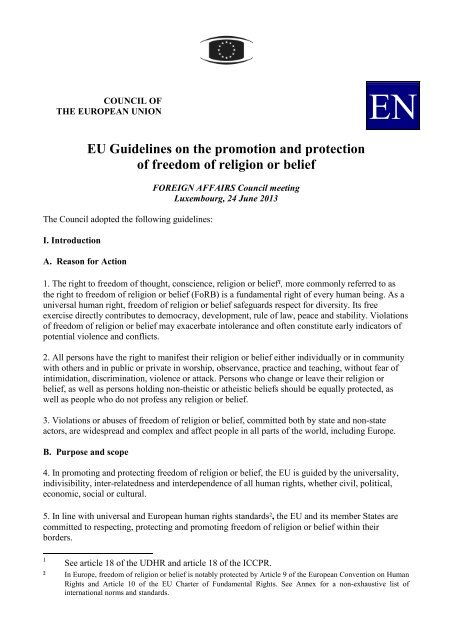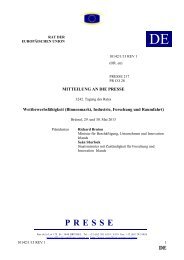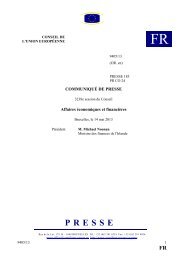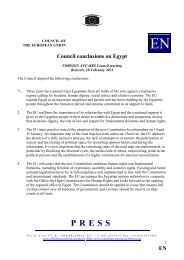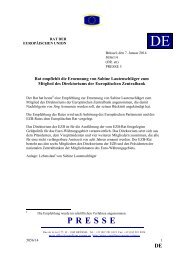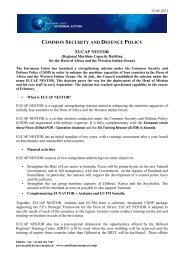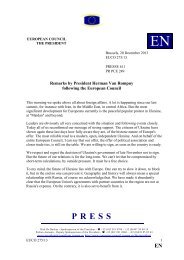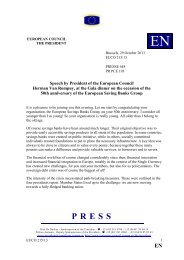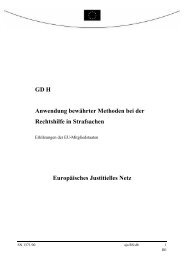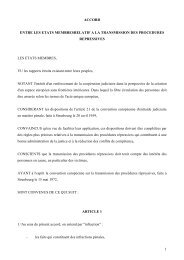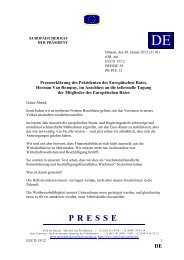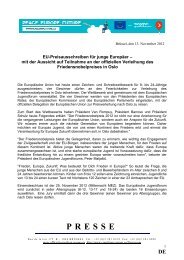EU Guidelines on the promotion and protection of freedom of ...
EU Guidelines on the promotion and protection of freedom of ...
EU Guidelines on the promotion and protection of freedom of ...
You also want an ePaper? Increase the reach of your titles
YUMPU automatically turns print PDFs into web optimized ePapers that Google loves.
COUCIL OF<br />
THE <str<strong>on</strong>g>EU</str<strong>on</strong>g>ROPEA UIO<br />
EN<br />
<str<strong>on</strong>g>EU</str<strong>on</strong>g> <str<strong>on</strong>g>Guidelines</str<strong>on</strong>g> <strong>on</strong> <strong>the</strong> promoti<strong>on</strong> <strong>and</strong> protecti<strong>on</strong><br />
<strong>of</strong> <strong>freedom</strong> <strong>of</strong> religi<strong>on</strong> or belief<br />
The Council adopted <strong>the</strong> following guidelines:<br />
I. Introducti<strong>on</strong><br />
A. Reas<strong>on</strong> for Acti<strong>on</strong><br />
FOREIG AFFAIRS Council meeting<br />
Luxembourg, 24 June 2013<br />
1. The right to <strong>freedom</strong> <strong>of</strong> thought, c<strong>on</strong>science, religi<strong>on</strong> or belief 1 , more comm<strong>on</strong>ly referred to as<br />
<strong>the</strong> right to <strong>freedom</strong> <strong>of</strong> religi<strong>on</strong> or belief (FoRB) is a fundamental right <strong>of</strong> every human being. As a<br />
universal human right, <strong>freedom</strong> <strong>of</strong> religi<strong>on</strong> or belief safeguards respect for diversity. Its free<br />
exercise directly c<strong>on</strong>tributes to democracy, development, rule <strong>of</strong> law, peace <strong>and</strong> stability. Violati<strong>on</strong>s<br />
<strong>of</strong> <strong>freedom</strong> <strong>of</strong> religi<strong>on</strong> or belief may exacerbate intolerance <strong>and</strong> <strong>of</strong>ten c<strong>on</strong>stitute early indicators <strong>of</strong><br />
potential violence <strong>and</strong> c<strong>on</strong>flicts.<br />
2. All pers<strong>on</strong>s have <strong>the</strong> right to manifest <strong>the</strong>ir religi<strong>on</strong> or belief ei<strong>the</strong>r individually or in community<br />
with o<strong>the</strong>rs <strong>and</strong> in public or private in worship, observance, practice <strong>and</strong> teaching, without fear <strong>of</strong><br />
intimidati<strong>on</strong>, discriminati<strong>on</strong>, violence or attack. Pers<strong>on</strong>s who change or leave <strong>the</strong>ir religi<strong>on</strong> or<br />
belief, as well as pers<strong>on</strong>s holding n<strong>on</strong>-<strong>the</strong>istic or a<strong>the</strong>istic beliefs should be equally protected, as<br />
well as people who do not pr<strong>of</strong>ess any religi<strong>on</strong> or belief.<br />
3. Violati<strong>on</strong>s or abuses <strong>of</strong> <strong>freedom</strong> <strong>of</strong> religi<strong>on</strong> or belief, committed both by state <strong>and</strong> n<strong>on</strong>-state<br />
actors, are widespread <strong>and</strong> complex <strong>and</strong> affect people in all parts <strong>of</strong> <strong>the</strong> world, including Europe.<br />
B. Purpose <strong>and</strong> scope<br />
4. In promoting <strong>and</strong> protecting <strong>freedom</strong> <strong>of</strong> religi<strong>on</strong> or belief, <strong>the</strong> <str<strong>on</strong>g>EU</str<strong>on</strong>g> is guided by <strong>the</strong> universality,<br />
indivisibility, inter-relatedness <strong>and</strong> interdependence <strong>of</strong> all human rights, whe<strong>the</strong>r civil, political,<br />
ec<strong>on</strong>omic, social or cultural.<br />
5. In line with universal <strong>and</strong> European human rights st<strong>and</strong>ards 2 , <strong>the</strong> <str<strong>on</strong>g>EU</str<strong>on</strong>g> <strong>and</strong> its member States are<br />
committed to respecting, protecting <strong>and</strong> promoting <strong>freedom</strong> <strong>of</strong> religi<strong>on</strong> or belief within <strong>the</strong>ir<br />
borders.<br />
1<br />
See article 18 <strong>of</strong> <strong>the</strong> UDHR <strong>and</strong> article 18 <strong>of</strong> <strong>the</strong> ICCPR.<br />
2<br />
In Europe, <strong>freedom</strong> <strong>of</strong> religi<strong>on</strong> or belief is notably protected by Article 9 <strong>of</strong> <strong>the</strong> European C<strong>on</strong>venti<strong>on</strong> <strong>on</strong> Human<br />
Rights <strong>and</strong> Article 10 <strong>of</strong> <strong>the</strong> <str<strong>on</strong>g>EU</str<strong>on</strong>g> Charter <strong>of</strong> Fundamental Rights. See Annex for a n<strong>on</strong>-exhaustive list <strong>of</strong><br />
internati<strong>on</strong>al norms <strong>and</strong> st<strong>and</strong>ards.
6. With <strong>the</strong>se <str<strong>on</strong>g>Guidelines</str<strong>on</strong>g>, <strong>the</strong> <str<strong>on</strong>g>EU</str<strong>on</strong>g> reaffirms its determinati<strong>on</strong> to promote, in its external human rights<br />
policy, <strong>freedom</strong> <strong>of</strong> religi<strong>on</strong> or belief as a right to be exercised by every<strong>on</strong>e everywhere, based <strong>on</strong> <strong>the</strong><br />
principles <strong>of</strong> equality, n<strong>on</strong>-discriminati<strong>on</strong> <strong>and</strong> universality. Through its external policy instruments,<br />
<strong>the</strong> <str<strong>on</strong>g>EU</str<strong>on</strong>g> intends to help prevent <strong>and</strong> address violati<strong>on</strong>s <strong>of</strong> this right in a timely, c<strong>on</strong>sistent <strong>and</strong><br />
coherent manner.<br />
7. In doing so, <strong>the</strong> <str<strong>on</strong>g>EU</str<strong>on</strong>g> focuses <strong>on</strong> <strong>the</strong> right <strong>of</strong> individuals, to believe or not to believe, <strong>and</strong>, al<strong>on</strong>e or<br />
in community with o<strong>the</strong>rs, to freely manifest <strong>the</strong>ir beliefs. The <str<strong>on</strong>g>EU</str<strong>on</strong>g> does not c<strong>on</strong>sider <strong>the</strong> merits <strong>of</strong><br />
<strong>the</strong> different religi<strong>on</strong>s or beliefs, or <strong>the</strong> lack <strong>the</strong>re<strong>of</strong>, but ensures that <strong>the</strong> right to believe or not to<br />
believe is upheld. The <str<strong>on</strong>g>EU</str<strong>on</strong>g> is impartial <strong>and</strong> is not aligned with any specific religi<strong>on</strong> or belief.<br />
8. The <str<strong>on</strong>g>Guidelines</str<strong>on</strong>g> explain what <strong>the</strong> internati<strong>on</strong>al human rights st<strong>and</strong>ards <strong>on</strong> <strong>freedom</strong> <strong>of</strong> religi<strong>on</strong> or<br />
belief are, <strong>and</strong> give clear political lines to <strong>of</strong>ficials <strong>of</strong> <str<strong>on</strong>g>EU</str<strong>on</strong>g> instituti<strong>on</strong>s <strong>and</strong> <str<strong>on</strong>g>EU</str<strong>on</strong>g> Member States, to be<br />
used in c<strong>on</strong>tacts with third countries <strong>and</strong> with internati<strong>on</strong>al <strong>and</strong> civil society organisati<strong>on</strong>s. They<br />
also provide <strong>of</strong>ficials with practical guidance <strong>on</strong> how to seek to prevent violati<strong>on</strong>s <strong>of</strong> <strong>freedom</strong> <strong>of</strong><br />
religi<strong>on</strong> or belief, to analyse cases, <strong>and</strong> to react effectively to violati<strong>on</strong>s wherever <strong>the</strong>y occur, in<br />
order to promote <strong>and</strong> protect <strong>freedom</strong> <strong>of</strong> religi<strong>on</strong> or belief in <strong>the</strong> <str<strong>on</strong>g>EU</str<strong>on</strong>g>'s external acti<strong>on</strong>.<br />
C. Definiti<strong>on</strong>s<br />
9. Freedom <strong>of</strong> religi<strong>on</strong> or belief is enshrined in Articles 18 <strong>of</strong> both <strong>the</strong> Universal Declarati<strong>on</strong> <strong>of</strong><br />
Human Rights (UDHR) <strong>and</strong> <strong>of</strong> <strong>the</strong> Internati<strong>on</strong>al Covenant <strong>on</strong> Civil <strong>and</strong> Political Rights (ICCPR),<br />
which should be read in <strong>the</strong> light <strong>of</strong> <strong>the</strong> UN Human Rights Committee's General Comment n°22.<br />
Under internati<strong>on</strong>al law, FoRB has two comp<strong>on</strong>ents:<br />
(a) <strong>the</strong> <strong>freedom</strong> to have or not to have or adopt (which includes <strong>the</strong> right to change) a<br />
religi<strong>on</strong> or belief <strong>of</strong> <strong>on</strong>e’s choice, <strong>and</strong><br />
(b) <strong>the</strong> <strong>freedom</strong> to manifest <strong>on</strong>e's religi<strong>on</strong> or belief, individually or in community with<br />
o<strong>the</strong>rs, in public or private, through worship, observance, practice <strong>and</strong> teaching.<br />
10. In line with <strong>the</strong>se provisi<strong>on</strong>s, <strong>the</strong> <str<strong>on</strong>g>EU</str<strong>on</strong>g> has recalled that "<strong>freedom</strong> <strong>of</strong> thought, c<strong>on</strong>science, religi<strong>on</strong><br />
or belief, applies equally to all pers<strong>on</strong>s. It is a fundamental <strong>freedom</strong> that includes all religi<strong>on</strong>s or<br />
beliefs, including those that have not been traditi<strong>on</strong>ally practised in a particular country, <strong>the</strong> beliefs<br />
<strong>of</strong> pers<strong>on</strong>s bel<strong>on</strong>ging to religious minorities, as well as n<strong>on</strong>-<strong>the</strong>istic <strong>and</strong> a<strong>the</strong>istic beliefs. The<br />
<strong>freedom</strong> also covers <strong>the</strong> right to adopt, change or ab<strong>and</strong><strong>on</strong> <strong>on</strong>e's religi<strong>on</strong> or belief, <strong>of</strong> <strong>on</strong>e's own<br />
free will." 3<br />
-- Right to have a religi<strong>on</strong>, to hold a belief, or not to believe<br />
11. Theistic, n<strong>on</strong>-<strong>the</strong>istic <strong>and</strong> a<strong>the</strong>istic beliefs, as well as <strong>the</strong> right not to pr<strong>of</strong>ess any religi<strong>on</strong> or<br />
belief are protected under article 18 ICCPR 4 . The terms “belief” <strong>and</strong> “religi<strong>on</strong>” are to be broadly<br />
c<strong>on</strong>strued <strong>and</strong> <strong>the</strong> article's applicati<strong>on</strong> should not be limited to traditi<strong>on</strong>al religi<strong>on</strong>s or to religi<strong>on</strong>s<br />
<strong>and</strong> beliefs with instituti<strong>on</strong>al characteristics or practices analogous to those <strong>of</strong> traditi<strong>on</strong>al religi<strong>on</strong>s.<br />
States should not restrict <strong>the</strong> <strong>freedom</strong> to hold any religi<strong>on</strong> or belief. Coerci<strong>on</strong> to change, recant or<br />
reveal <strong>on</strong>e’s religi<strong>on</strong> or belief is equally prohibited.<br />
3<br />
4<br />
Council C<strong>on</strong>clusi<strong>on</strong>s <strong>on</strong> Freedom <strong>of</strong> religi<strong>on</strong> or belief; 16 November 2009.<br />
See General Comment n°22.
12. Holding or not holding a religi<strong>on</strong> or belief is an absolute right <strong>and</strong> may not be limited under any<br />
circumstances 5 .<br />
-- Right to manifest <strong>on</strong>e's religi<strong>on</strong> or belief<br />
13. Article 18 <strong>of</strong> <strong>the</strong> ICCPR recognises <strong>the</strong> right <strong>of</strong> people to "manifest" <strong>the</strong>ir religi<strong>on</strong> or belief,<br />
al<strong>on</strong>e or in community with o<strong>the</strong>rs, both publicly <strong>and</strong> privately. This <strong>freedom</strong> to manifest religi<strong>on</strong> or<br />
belief e.g. in worship, observance, practice <strong>and</strong> teaching, potentially "encompasses a broad range <strong>of</strong><br />
acts" 6 , whose close <strong>and</strong> direct link with a religi<strong>on</strong> or belief must be looked at <strong>on</strong> a case-by case<br />
basis.<br />
14. As opposed to <strong>the</strong> <strong>freedom</strong> to have a religi<strong>on</strong>, to hold a belief or not to believe, <strong>the</strong> <strong>freedom</strong> to<br />
manifest <strong>on</strong>e's religi<strong>on</strong> or belief may be subject to limitati<strong>on</strong>s, but "<strong>on</strong>ly to such limitati<strong>on</strong>s as are<br />
prescribed by law <strong>and</strong> are necessary to protect public safety, order, health or morals or <strong>the</strong><br />
fundamental rights <strong>and</strong> <strong>freedom</strong>s <strong>of</strong> o<strong>the</strong>rs." 7 These limitati<strong>on</strong>s must be in accordance with<br />
internati<strong>on</strong>al st<strong>and</strong>ards <strong>and</strong> must be strictly interpreted. Limitati<strong>on</strong>s for o<strong>the</strong>r reas<strong>on</strong>s, such as<br />
nati<strong>on</strong>al security, are not permitted. Based <strong>on</strong> article 18.3 <strong>of</strong> <strong>the</strong> ICCPR <strong>and</strong> as developed in<br />
General Comment 22, any limitati<strong>on</strong>s must meet with <strong>the</strong> following criteria: <strong>the</strong>y must be<br />
established by law, not applied in a way that vitiate <strong>the</strong> rights guaranteed in article 18, <strong>on</strong>ly applied<br />
for those purposes for which <strong>the</strong>y were prescribed, directly related <strong>and</strong> proporti<strong>on</strong>ate to <strong>the</strong> specific<br />
need for which <strong>the</strong>y were designed, <strong>and</strong> not imposed for discriminatory purposes or applied in a<br />
discriminatory manner. Where restricti<strong>on</strong>s are justified <strong>on</strong> <strong>the</strong> basis <strong>of</strong> a need to protect public<br />
morals, such restricti<strong>on</strong>s must be based <strong>on</strong> principles not deriving exclusively from a single<br />
traditi<strong>on</strong>, as <strong>the</strong> c<strong>on</strong>cept <strong>of</strong> morals derives from many social, philosophical <strong>and</strong> religious traditi<strong>on</strong>s.<br />
Fur<strong>the</strong>rmore, any such limitati<strong>on</strong>s must be understood in <strong>the</strong> light <strong>of</strong> universality <strong>of</strong> human rights<br />
<strong>and</strong> <strong>the</strong> principle <strong>of</strong> n<strong>on</strong>-discriminati<strong>on</strong>. 8<br />
II. Operati<strong>on</strong>al <str<strong>on</strong>g>Guidelines</str<strong>on</strong>g><br />
A. Basic Principles <strong>of</strong> Acti<strong>on</strong><br />
15. <str<strong>on</strong>g>EU</str<strong>on</strong>g> acti<strong>on</strong> <strong>on</strong> <strong>freedom</strong> <strong>of</strong> religi<strong>on</strong> or belief will be based <strong>on</strong> <strong>the</strong> following overriding principles:<br />
1. Universal character <strong>of</strong> <strong>freedom</strong> <strong>of</strong> religi<strong>on</strong> or belief<br />
16. Freedom <strong>of</strong> thought, c<strong>on</strong>science, religi<strong>on</strong> or belief applies to all pers<strong>on</strong>s equally. 9 It is a<br />
universal human right that needs to be protected everywhere <strong>and</strong> for every<strong>on</strong>e, 10 regardless <strong>of</strong> who<br />
<strong>the</strong>y are, where <strong>the</strong>y live, <strong>and</strong> what <strong>the</strong>y believe or do not believe in.<br />
5<br />
6<br />
7<br />
8<br />
9<br />
10<br />
Not even in time <strong>of</strong> public emergency – see article 4.2 <strong>of</strong> <strong>the</strong> ICCPR.<br />
See indicative examples <strong>of</strong> paragraph 4 <strong>of</strong> <strong>the</strong> General Comment n°22.<br />
See art 18.3 ICCPR.<br />
See General Comment n°34.<br />
Council C<strong>on</strong>clusi<strong>on</strong>s <strong>on</strong> Freedom <strong>of</strong> religi<strong>on</strong> or belief, 16 November 2009.<br />
Council C<strong>on</strong>clusi<strong>on</strong>s <strong>on</strong> intolerance, discriminati<strong>on</strong> <strong>and</strong> violence <strong>on</strong> <strong>the</strong> basis <strong>of</strong> religi<strong>on</strong> or<br />
belief, 21 February 2011.
17. The universality <strong>of</strong> <strong>freedom</strong> <strong>of</strong> religi<strong>on</strong> or belief is based <strong>on</strong> <strong>the</strong> Universal Declarati<strong>on</strong> <strong>of</strong><br />
Human Rights <strong>and</strong> internati<strong>on</strong>al treaties, 11 such as <strong>the</strong> ICCPR. Regi<strong>on</strong>al human right treaties 12 can<br />
also be referred to as appropriate to <strong>the</strong> extent that <strong>the</strong>y are c<strong>on</strong>sistent with <strong>the</strong> ICCPR.<br />
2. Freedom <strong>of</strong> religi<strong>on</strong> or belief is an individual right which can be exercised in community<br />
with o<strong>the</strong>rs<br />
18. Freedom <strong>of</strong> religi<strong>on</strong> or belief protects every human being’s right to believe or to hold an<br />
a<strong>the</strong>istic or n<strong>on</strong>-<strong>the</strong>istic belief, <strong>and</strong> to change religi<strong>on</strong> or belief. It does not protect a religi<strong>on</strong> or<br />
belief as such. Freedom <strong>of</strong> religi<strong>on</strong> or belief applies to individuals, as right-holders, who may<br />
exercise this right ei<strong>the</strong>r individually or in community with o<strong>the</strong>rs <strong>and</strong> in public or private. Its<br />
exercise may thus also have a collective aspect.<br />
19. This includes rights for communities to perform “acts integral to <strong>the</strong> c<strong>on</strong>duct by religious<br />
groups <strong>of</strong> <strong>the</strong>ir basic affairs” 13 . These rights include, but are not limited to, legal pers<strong>on</strong>ality <strong>and</strong><br />
n<strong>on</strong>-interference in internal affairs, including <strong>the</strong> right to establish <strong>and</strong> maintain freely accessible<br />
places <strong>of</strong> worship or assembly, <strong>the</strong> <strong>freedom</strong> to select <strong>and</strong> train leaders or <strong>the</strong> right to carry out<br />
social, cultural, educati<strong>on</strong>al <strong>and</strong> charitable activities.<br />
20. There are no rights exclusive to holders <strong>of</strong> any particular religi<strong>on</strong> or belief: all rights whe<strong>the</strong>r in<br />
regard to <strong>the</strong> <strong>freedom</strong> to believe or to manifest <strong>on</strong>e's religi<strong>on</strong> or belief, are universal <strong>and</strong> are to be<br />
respected <strong>on</strong> a n<strong>on</strong>-discriminatory basis.<br />
3. Primary role <strong>of</strong> States in ensuring <strong>freedom</strong> <strong>of</strong> religi<strong>on</strong> or belief<br />
21. States must ensure that <strong>the</strong>ir legal systems provide adequate <strong>and</strong> effective guarantees <strong>of</strong> <strong>freedom</strong><br />
<strong>of</strong> thought, c<strong>on</strong>science, religi<strong>on</strong> or belief to all, which are applicable to <strong>the</strong>ir entire territory without<br />
exclusi<strong>on</strong> or discriminati<strong>on</strong>, <strong>and</strong> that <strong>the</strong>se provisi<strong>on</strong>s are properly enforced.<br />
22. States have a primary duty to protect all individuals living in <strong>the</strong>ir territory <strong>and</strong> subject to <strong>the</strong>ir<br />
jurisdicti<strong>on</strong>, including pers<strong>on</strong>s holding n<strong>on</strong>-<strong>the</strong>istic or a<strong>the</strong>istic beliefs, pers<strong>on</strong>s bel<strong>on</strong>ging to<br />
minorities 14 , <strong>and</strong> indigenous peoples 15 <strong>and</strong> to safeguard <strong>the</strong>ir rights. States must treat all individuals<br />
equally without discriminati<strong>on</strong> <strong>on</strong> <strong>the</strong> basis <strong>of</strong> <strong>the</strong>ir religi<strong>on</strong> or belief 16 .<br />
23. States must put in place effective measures in order to prevent or sancti<strong>on</strong> violati<strong>on</strong>s <strong>of</strong> <strong>freedom</strong><br />
<strong>of</strong> religi<strong>on</strong> or belief when <strong>the</strong>y occur, <strong>and</strong> ensure accountability.<br />
24. Moreover, parties to <strong>the</strong> ICCPR have an obligati<strong>on</strong> to prohibit any public advocacy <strong>of</strong> religious<br />
hatred that c<strong>on</strong>stitutes incitement to discriminati<strong>on</strong>, hostility or violence 17 . States should c<strong>on</strong>demn<br />
all acts <strong>of</strong> violence <strong>and</strong> bring perpetrators to justice.<br />
11<br />
12<br />
13<br />
14<br />
15<br />
16<br />
17<br />
A n<strong>on</strong> exhaustive list <strong>of</strong> relevant treaties <strong>and</strong> declarati<strong>on</strong>s can be found in <strong>the</strong> Annex <strong>of</strong> <strong>the</strong>se <str<strong>on</strong>g>Guidelines</str<strong>on</strong>g>.<br />
African Charter <strong>on</strong> Human <strong>and</strong> Peoples' Rights; American C<strong>on</strong>venti<strong>on</strong> <strong>on</strong> Human Rights;<br />
Revised Arab Charter <strong>on</strong> Human Rights; European C<strong>on</strong>venti<strong>on</strong> <strong>on</strong> Human Rights.<br />
See general Comment n°22, paragraph 4.<br />
See article 27 <strong>of</strong> <strong>the</strong> ICCPR, with specific reference to religious minorities, <strong>and</strong> UN<br />
declarati<strong>on</strong> 47/135 <strong>on</strong> <strong>the</strong> rights <strong>of</strong> pers<strong>on</strong>s bel<strong>on</strong>ging to minorities, article 2.<br />
See UN declarati<strong>on</strong> 61/295 <strong>on</strong> <strong>the</strong> rights <strong>of</strong> indigenous peoples, article 11 <strong>and</strong> 12.<br />
See article 26 <strong>of</strong> <strong>the</strong> ICCPR.<br />
Article 20 paragraph 2 <strong>of</strong> <strong>the</strong> ICCPR; such a prohibiti<strong>on</strong> was enforced in <str<strong>on</strong>g>EU</str<strong>on</strong>g> legislati<strong>on</strong><br />
through <strong>the</strong> 2008 <str<strong>on</strong>g>EU</str<strong>on</strong>g> framework decisi<strong>on</strong> <strong>on</strong> combating racism <strong>and</strong> xenophobia, under which
4. C<strong>on</strong>necti<strong>on</strong> with <strong>the</strong> defence <strong>of</strong> o<strong>the</strong>r human rights <strong>and</strong> with o<strong>the</strong>r <str<strong>on</strong>g>EU</str<strong>on</strong>g> guidelines <strong>on</strong><br />
human rights<br />
25. Freedom <strong>of</strong> religi<strong>on</strong> or belief is intrinsically linked to <strong>freedom</strong> <strong>of</strong> opini<strong>on</strong> <strong>and</strong> expressi<strong>on</strong>,<br />
<strong>freedom</strong> <strong>of</strong> associati<strong>on</strong> <strong>and</strong> assembly as well as to o<strong>the</strong>r human rights <strong>and</strong> fundamental <strong>freedom</strong>s all<br />
<strong>of</strong> which c<strong>on</strong>tribute towards <strong>the</strong> building <strong>of</strong> pluralistic, tolerant, <strong>and</strong> democratic societies.<br />
Expressi<strong>on</strong> <strong>of</strong> a religious or n<strong>on</strong>-religious belief, or <strong>of</strong> an opini<strong>on</strong> c<strong>on</strong>cerning a religi<strong>on</strong> or belief, is<br />
also protected by <strong>the</strong> right to <strong>freedom</strong> <strong>of</strong> opini<strong>on</strong> <strong>and</strong> expressi<strong>on</strong> enshrined in Article 19 <strong>of</strong> <strong>the</strong><br />
ICCPR.<br />
26. Certain practices associated with <strong>the</strong> manifestati<strong>on</strong> <strong>of</strong> a religi<strong>on</strong> or belief, or perceived as such,<br />
may c<strong>on</strong>stitute violati<strong>on</strong>s <strong>of</strong> internati<strong>on</strong>al human rights st<strong>and</strong>ards. The right to <strong>freedom</strong> <strong>of</strong> religi<strong>on</strong><br />
or belief is sometimes invoked to justify such violati<strong>on</strong>s. The <str<strong>on</strong>g>EU</str<strong>on</strong>g> firmly opposes such justificati<strong>on</strong>,<br />
whilst remaining fully committed to <strong>the</strong> robust protecti<strong>on</strong> <strong>and</strong> promoti<strong>on</strong> <strong>of</strong> <strong>freedom</strong> <strong>of</strong> religi<strong>on</strong> or<br />
belief in all parts <strong>of</strong> <strong>the</strong> world. Violati<strong>on</strong>s <strong>of</strong>ten affect women, members <strong>of</strong> religious minorities, as<br />
well as pers<strong>on</strong>s <strong>on</strong> <strong>the</strong> basis <strong>of</strong> <strong>the</strong>ir sexual orientati<strong>on</strong> or gender identity.<br />
27. In dealing with possible violati<strong>on</strong>s, use will be made <strong>of</strong> existing <str<strong>on</strong>g>EU</str<strong>on</strong>g> human rights guidelines,<br />
notably <strong>the</strong> guidelines <strong>on</strong> <strong>the</strong> promoti<strong>on</strong> <strong>and</strong> protecti<strong>on</strong> <strong>of</strong> rights <strong>of</strong> <strong>the</strong> child, <strong>on</strong> violence against<br />
woman <strong>and</strong> girls <strong>and</strong> combating all forms <strong>of</strong> discriminati<strong>on</strong> against <strong>the</strong>m, <strong>on</strong> human rights<br />
defenders, <strong>on</strong> torture <strong>and</strong> <strong>on</strong> <strong>the</strong> death penalty, as well as <strong>the</strong> forthcoming <str<strong>on</strong>g>EU</str<strong>on</strong>g> guidelines <strong>on</strong> <strong>the</strong><br />
enjoyment <strong>of</strong> all human rights by LGBTI pers<strong>on</strong>s, <strong>and</strong> <strong>on</strong> <strong>freedom</strong> <strong>of</strong> expressi<strong>on</strong> <strong>on</strong> line <strong>and</strong> <strong>of</strong>f<br />
line.<br />
B. Priority Areas <strong>of</strong> Acti<strong>on</strong><br />
28. When addressing <strong>freedom</strong> <strong>of</strong> religi<strong>on</strong> or belief, <strong>the</strong> <str<strong>on</strong>g>EU</str<strong>on</strong>g> will pay special attenti<strong>on</strong> to <strong>the</strong><br />
following <strong>the</strong>mes, which are all <strong>of</strong> equal importance:<br />
1. Violence<br />
29. States have an obligati<strong>on</strong> to guarantee human rights protecti<strong>on</strong>, <strong>and</strong> to exercise due diligence to<br />
prevent, investigate <strong>and</strong> punish acts <strong>of</strong> violence against pers<strong>on</strong>s based <strong>on</strong> <strong>the</strong>ir religi<strong>on</strong> or belief.<br />
Violence or <strong>the</strong> threat <strong>the</strong>re<strong>of</strong> – such as killing, executi<strong>on</strong>, disappearance, torture, sexual violence,<br />
abducti<strong>on</strong>s <strong>and</strong> inhuman or degrading treatment – are widespread phenomena that have to be<br />
addressed. Such violence may be committed by state or n<strong>on</strong>-state actors, based <strong>on</strong> <strong>the</strong> actual or<br />
assumed religi<strong>on</strong> or belief <strong>of</strong> <strong>the</strong> targeted pers<strong>on</strong> or based <strong>on</strong> <strong>the</strong> religious or<br />
c<strong>on</strong>victi<strong>on</strong>al/ideological tenets <strong>of</strong> <strong>the</strong> perpetrator.<br />
30. The <str<strong>on</strong>g>EU</str<strong>on</strong>g> will:<br />
a. Publicly c<strong>on</strong>demn <strong>the</strong> executi<strong>on</strong> or killing <strong>of</strong> individuals <strong>and</strong> o<strong>the</strong>r acts <strong>of</strong> grave violence <strong>on</strong><br />
<strong>the</strong> grounds <strong>of</strong> religi<strong>on</strong> or belief. The <str<strong>on</strong>g>EU</str<strong>on</strong>g> will also c<strong>on</strong>sider additi<strong>on</strong>al sancti<strong>on</strong>s, where<br />
appropriate.<br />
b. Dem<strong>and</strong> immediate accountability <strong>of</strong> state or n<strong>on</strong>-state perpetrators <strong>of</strong> such violence <strong>and</strong><br />
follow judicial proceedings to ensure that justice is delivered.<br />
Member States have to punish with dissuasive penalties public incitement to violence or<br />
hatred directed against a group <strong>of</strong> pers<strong>on</strong>s or a member <strong>of</strong> such a group defined, notably, <strong>on</strong><br />
<strong>the</strong> basis <strong>of</strong> religi<strong>on</strong> or belief.
c. Str<strong>on</strong>gly encourage state <strong>and</strong> o<strong>the</strong>r influential actors in a society, whe<strong>the</strong>r religious or not, to<br />
speak out against acts <strong>of</strong> violence <strong>and</strong> to publicly denounce such acts at <strong>the</strong> highest level,<br />
particularly in cases where <strong>of</strong>ficials actively encourage or c<strong>on</strong>d<strong>on</strong>e attacks <strong>on</strong> individuals or<br />
communities <strong>and</strong> property, including places <strong>of</strong> worship or meeting, or historical religious<br />
sites.<br />
d. Protest when state <strong>of</strong>ficials or influential n<strong>on</strong>-state actors spread inflammatory messages<br />
about <strong>the</strong> holders <strong>of</strong> certain religious or o<strong>the</strong>r beliefs, including <strong>the</strong>istic, n<strong>on</strong>-<strong>the</strong>istic or<br />
a<strong>the</strong>istic persuasi<strong>on</strong>s, especially when <strong>the</strong>y openly call for, or justify, violence against <strong>the</strong>m.<br />
e. Dem<strong>and</strong> <strong>the</strong> nati<strong>on</strong>al adopti<strong>on</strong> <strong>of</strong> laws that prohibit public advocacy <strong>of</strong> religious hatred that<br />
c<strong>on</strong>stitutes incitement to discriminati<strong>on</strong>, hostility or violence (Art. 20 paragraph 2 <strong>of</strong> <strong>the</strong><br />
ICCPR).<br />
f. C<strong>on</strong>sistently c<strong>on</strong>demn any violence against women <strong>and</strong> girls, including "h<strong>on</strong>our" killings,<br />
female genital mutilati<strong>on</strong>, early <strong>and</strong> forced marriages, as well as violence against pers<strong>on</strong>s <strong>on</strong><br />
<strong>the</strong> basis <strong>of</strong> <strong>the</strong>ir sexual orientati<strong>on</strong> or gender identity including situati<strong>on</strong>s when violence is<br />
perpetrated under <strong>the</strong> pretext <strong>of</strong> a religious prescripti<strong>on</strong> or practice. The <str<strong>on</strong>g>EU</str<strong>on</strong>g> shall promote<br />
initiatives, including legislati<strong>on</strong>, to prevent <strong>and</strong> criminalize such violence.<br />
2. Freedom <strong>of</strong> expressi<strong>on</strong><br />
31. Freedom <strong>of</strong> religi<strong>on</strong> or belief <strong>and</strong> <strong>the</strong> <strong>freedom</strong> <strong>of</strong> expressi<strong>on</strong> are interdependent, interrelated <strong>and</strong><br />
mutually reinforcing rights, protecting all pers<strong>on</strong>s - not religi<strong>on</strong>s or beliefs in <strong>the</strong>mselves - <strong>and</strong><br />
protecting also <strong>the</strong> right to express opini<strong>on</strong>s <strong>on</strong> any or all religi<strong>on</strong>s <strong>and</strong> beliefs. Censorship <strong>and</strong><br />
restricti<strong>on</strong>s <strong>on</strong> <strong>the</strong> publicati<strong>on</strong> <strong>and</strong> distributi<strong>on</strong> <strong>of</strong> literature or <strong>of</strong> websites related to religi<strong>on</strong> or<br />
belief are comm<strong>on</strong> violati<strong>on</strong>s <strong>of</strong> both <strong>of</strong> <strong>the</strong>se <strong>freedom</strong>s, <strong>and</strong> impair <strong>the</strong> ability <strong>of</strong> individuals <strong>and</strong><br />
communities to practice <strong>the</strong>ir religi<strong>on</strong> or belief. Limitati<strong>on</strong>s to <strong>the</strong> right to express opini<strong>on</strong>s <strong>on</strong><br />
religi<strong>on</strong> or belief are a source <strong>of</strong> great vulnerability for people bel<strong>on</strong>ging to religi<strong>on</strong> or belief<br />
minorities, but also affect majorities, not least pers<strong>on</strong>s holding n<strong>on</strong>-traditi<strong>on</strong>al religious views.<br />
Taken toge<strong>the</strong>r, <strong>freedom</strong> <strong>of</strong> religi<strong>on</strong> or belief <strong>and</strong> <strong>freedom</strong> <strong>of</strong> expressi<strong>on</strong> play an important role in<br />
<strong>the</strong> fight against all forms <strong>of</strong> intolerance <strong>and</strong> discriminati<strong>on</strong> based <strong>on</strong> religi<strong>on</strong> or belief.<br />
32. In <strong>the</strong> event that violence is threatened or carried out, or restricti<strong>on</strong>s are imposed in c<strong>on</strong>necti<strong>on</strong><br />
with an expressi<strong>on</strong> <strong>of</strong> opini<strong>on</strong>s <strong>on</strong> religi<strong>on</strong> or belief, <strong>the</strong> <str<strong>on</strong>g>EU</str<strong>on</strong>g> will be guided by <strong>the</strong> following<br />
principles:<br />
a. When critical comments are expressed about religi<strong>on</strong>s or beliefs <strong>and</strong> such expressi<strong>on</strong> is<br />
perceived by adherents as being so <strong>of</strong>fensive that it may result in violence towards or by<br />
adherents, <strong>the</strong>n:<br />
o If <strong>the</strong>re is a prima facie case that this expressi<strong>on</strong> c<strong>on</strong>stitutes hate speech, i.e. falls within<br />
<strong>the</strong> strict scope <strong>of</strong> article 20 paragraph 2 <strong>of</strong> <strong>the</strong> ICCPR (which prohibits any advocacy <strong>of</strong><br />
religious hatred that c<strong>on</strong>stitutes incitement to discriminati<strong>on</strong>, hostility or violence), <strong>the</strong><br />
<str<strong>on</strong>g>EU</str<strong>on</strong>g> will denounce it, <strong>and</strong> dem<strong>and</strong> that it be investigated <strong>and</strong> tried by an independent<br />
judge.<br />
o If this expressi<strong>on</strong> does not rise to <strong>the</strong> level <strong>of</strong> incitement prohibited under article 20 <strong>of</strong> <strong>the</strong><br />
ICCPR, <strong>and</strong> is thus an exercise <strong>of</strong> free speech, <strong>the</strong> <str<strong>on</strong>g>EU</str<strong>on</strong>g> will:<br />
i. Resist any calls or attempts for <strong>the</strong> criminalisati<strong>on</strong> <strong>of</strong> such speech;<br />
ii. Individually or jointly with States or regi<strong>on</strong>al organisati<strong>on</strong>s, endeavour to issue<br />
statements calling for no violence to be committed <strong>and</strong> c<strong>on</strong>demning any violence<br />
committed in reacti<strong>on</strong> to such speech;<br />
iii. Encourage state <strong>and</strong> o<strong>the</strong>r influential actors, whe<strong>the</strong>r religious or n<strong>on</strong>-religious, to<br />
speak out <strong>and</strong> to engage in c<strong>on</strong>structive public debate c<strong>on</strong>cerning what <strong>the</strong>y see as<br />
<strong>of</strong>fensive speech, c<strong>on</strong>demning any form <strong>of</strong> violence;
iv. Recall that <strong>the</strong> most effective way to combat a perceived <strong>of</strong>fense from <strong>the</strong> exercise<br />
<strong>of</strong> <strong>freedom</strong> <strong>of</strong> expressi<strong>on</strong> is <strong>the</strong> use <strong>of</strong> <strong>freedom</strong> <strong>of</strong> expressi<strong>on</strong> itself. Freedom <strong>of</strong><br />
expressi<strong>on</strong> applies <strong>on</strong>line as well as <strong>of</strong>fline 18 . New forms <strong>of</strong> media as well as<br />
informati<strong>on</strong> <strong>and</strong> communicati<strong>on</strong>s technology provide those who feel <strong>of</strong>fended by<br />
criticism or rejecti<strong>on</strong> <strong>of</strong> <strong>the</strong>ir religi<strong>on</strong> or belief with <strong>the</strong> tools to instantly exercise<br />
<strong>the</strong>ir right <strong>of</strong> reply.<br />
o In any case, <strong>the</strong> <str<strong>on</strong>g>EU</str<strong>on</strong>g> will recall, when appropriate, that <strong>the</strong> right to <strong>freedom</strong> <strong>of</strong> religi<strong>on</strong> or<br />
belief, as enshrined in relevant internati<strong>on</strong>al st<strong>and</strong>ards, does not include <strong>the</strong> right to have<br />
a religi<strong>on</strong> or a belief that is free from criticism or ridicule 19 .<br />
b. When faced with restricti<strong>on</strong>s to <strong>freedom</strong> <strong>of</strong> expressi<strong>on</strong> in <strong>the</strong> name <strong>of</strong> religi<strong>on</strong> or belief, <strong>the</strong><br />
<str<strong>on</strong>g>EU</str<strong>on</strong>g> will:<br />
o Recall that restricti<strong>on</strong>s to <strong>freedom</strong> <strong>of</strong> expressi<strong>on</strong> shall <strong>on</strong>ly be such as are prescribed by<br />
law <strong>and</strong> are necessary to safeguard <strong>the</strong> rights or reputati<strong>on</strong> <strong>of</strong> o<strong>the</strong>rs, or for <strong>the</strong> protecti<strong>on</strong><br />
<strong>of</strong> nati<strong>on</strong>al security or <strong>of</strong> public order (ordre public) or <strong>of</strong> public health or morals, 20 <strong>and</strong><br />
that no nati<strong>on</strong>al security restricti<strong>on</strong> is permissible for <strong>freedom</strong> <strong>of</strong> religi<strong>on</strong> <strong>and</strong> belief 21 .<br />
o Defend <strong>the</strong> fact that sharing informati<strong>on</strong> about religi<strong>on</strong>s or beliefs <strong>and</strong> engaging in<br />
persuasi<strong>on</strong> <strong>on</strong> <strong>the</strong>se matters is protected under internati<strong>on</strong>al law, provided that such<br />
persuasi<strong>on</strong> is nei<strong>the</strong>r coercive nor impairs <strong>the</strong> <strong>freedom</strong> <strong>of</strong> o<strong>the</strong>rs.<br />
o Recall at all appropriate occasi<strong>on</strong>s that laws that criminalize blasphemy restrict<br />
expressi<strong>on</strong> c<strong>on</strong>cerning religious or o<strong>the</strong>r beliefs; that <strong>the</strong>y are <strong>of</strong>ten applied so as to<br />
persecute, mistreat, or intimidate pers<strong>on</strong>s bel<strong>on</strong>ging to religious or o<strong>the</strong>r minorities, <strong>and</strong><br />
that <strong>the</strong>y can have a serious inhibiting effect <strong>on</strong> <strong>freedom</strong> <strong>of</strong> expressi<strong>on</strong> <strong>and</strong> <strong>on</strong> <strong>freedom</strong> <strong>of</strong><br />
religi<strong>on</strong> or belief; <strong>and</strong> recommend <strong>the</strong> decriminalisati<strong>on</strong> <strong>of</strong> such <strong>of</strong>fences.<br />
o Forcefully advocate against <strong>the</strong> use <strong>of</strong> <strong>the</strong> death penalty, physical punishment, or<br />
deprivati<strong>on</strong> <strong>of</strong> liberty as penalties for blasphemy.<br />
o Recall that internati<strong>on</strong>al human rights law protects individuals, not Religi<strong>on</strong> or Belief per<br />
se. Protecting a religi<strong>on</strong> or belief may not be used to justify or c<strong>on</strong>d<strong>on</strong>e a restricti<strong>on</strong> or<br />
violati<strong>on</strong> <strong>of</strong> a human right exercised by individuals al<strong>on</strong>e or in community with o<strong>the</strong>rs.<br />
3. Promoti<strong>on</strong> <strong>of</strong> respect for diversity <strong>and</strong> tolerance<br />
33. The promoti<strong>on</strong> <strong>of</strong> religious tolerance, respect for diversity <strong>and</strong> mutual underst<strong>and</strong>ing are <strong>of</strong><br />
utmost importance with a view to creating an envir<strong>on</strong>ment c<strong>on</strong>ducive to <strong>the</strong> full enjoyment by all<br />
pers<strong>on</strong>s <strong>of</strong> <strong>freedom</strong> <strong>of</strong> religi<strong>on</strong> or belief.<br />
34. The <str<strong>on</strong>g>EU</str<strong>on</strong>g> will:<br />
a. Encourage state <strong>and</strong> o<strong>the</strong>r influential actors, whe<strong>the</strong>r religious or n<strong>on</strong>-religious, to refrain<br />
from fostering inter-religious tensi<strong>on</strong>s, ei<strong>the</strong>r by law or practice, to support pertinent<br />
initiatives to promote an atmosphere <strong>of</strong> respect <strong>and</strong> tolerance between all pers<strong>on</strong>s regardless<br />
<strong>of</strong> <strong>the</strong>ir religi<strong>on</strong> or belief, <strong>and</strong> to defuse emerging tensi<strong>on</strong>s.<br />
b. Call <strong>on</strong> states to promote, through <strong>the</strong> educati<strong>on</strong>al system <strong>and</strong> o<strong>the</strong>r means, respect for<br />
diversity <strong>and</strong> mutual underst<strong>and</strong>ing by encouraging a wider knowledge <strong>of</strong> <strong>the</strong> diversity <strong>of</strong><br />
religi<strong>on</strong>s <strong>and</strong> beliefs within <strong>the</strong>ir jurisdicti<strong>on</strong>.<br />
18<br />
19<br />
20<br />
21<br />
See UN Human Rights Council resoluti<strong>on</strong> 20/8.<br />
See paragraph 19 <strong>of</strong> <strong>the</strong> c<strong>on</strong>clusi<strong>on</strong>s <strong>of</strong> <strong>the</strong> Rabat Plan <strong>of</strong> Acti<strong>on</strong> <strong>on</strong> incitement to hatred, 5<br />
October 2012.<br />
Article 19.3 ICCPR.<br />
Article 18.3 ICCPR. See also General Comments n° 22 <strong>and</strong> 34.
c. Make use <strong>of</strong> all available tools, including <strong>the</strong> financial instruments, to promote a culture <strong>of</strong><br />
mutual respect, diversity, tolerance, dialogue <strong>and</strong> peace <strong>and</strong> coordinate, as appropriate, with<br />
regi<strong>on</strong>al <strong>and</strong> internati<strong>on</strong>al organisati<strong>on</strong>s in order to do so.<br />
4. Discriminati<strong>on</strong><br />
35. States have a duty to protect all pers<strong>on</strong>s within <strong>the</strong>ir jurisdicti<strong>on</strong> from direct <strong>and</strong> indirect<br />
discriminati<strong>on</strong> <strong>on</strong> grounds <strong>of</strong> religi<strong>on</strong> or belief, whatever <strong>the</strong> reas<strong>on</strong>s advanced for such<br />
discriminati<strong>on</strong>. This includes <strong>the</strong> duty to rescind discriminatory legislati<strong>on</strong>, implement legislati<strong>on</strong><br />
that protects <strong>freedom</strong> <strong>of</strong> religi<strong>on</strong> or belief, <strong>and</strong> halt <strong>of</strong>ficial practices that cause discriminati<strong>on</strong>, as<br />
well as to protect people from discriminati<strong>on</strong> by state <strong>and</strong> o<strong>the</strong>r influential actors, whe<strong>the</strong>r religious<br />
or n<strong>on</strong>-religious<br />
36. Beliefs or practices that are, or allegedly are, traditi<strong>on</strong>al are <strong>of</strong>ten used to justify discriminati<strong>on</strong><br />
or coerci<strong>on</strong> <strong>on</strong> <strong>the</strong> basis <strong>of</strong> religi<strong>on</strong> or belief. Examples <strong>of</strong> this include denial <strong>of</strong> access to<br />
employment or educati<strong>on</strong> for women, bride kidnapping, early <strong>and</strong> forced marriage or female genital<br />
mutilati<strong>on</strong>. Communities do not have <strong>the</strong> right to violate <strong>the</strong> rights <strong>of</strong> individual members <strong>of</strong> that<br />
community. All individuals, including women <strong>and</strong> girls, have <strong>the</strong> right to a religi<strong>on</strong> or belief <strong>of</strong> <strong>the</strong>ir<br />
own individual choice, including not to have a religi<strong>on</strong> or belief. Attenti<strong>on</strong> needs also to be paid to<br />
discriminati<strong>on</strong> against ethnic groups, pers<strong>on</strong>s <strong>on</strong> <strong>the</strong> basis <strong>of</strong> <strong>the</strong>ir sexual orientati<strong>on</strong> or gender<br />
identity, or adherents to certain doctrinal interpretati<strong>on</strong>s.<br />
37. The <str<strong>on</strong>g>EU</str<strong>on</strong>g> will:<br />
a. C<strong>on</strong>demn <strong>and</strong> take appropriate acti<strong>on</strong> (demarches, public statements, support for CSOs <strong>and</strong><br />
HRDs, etc.) against all forms <strong>of</strong> intolerance <strong>and</strong> discriminati<strong>on</strong> against pers<strong>on</strong>s because <strong>of</strong><br />
<strong>the</strong>ir religi<strong>on</strong> or belief as c<strong>on</strong>trary to <strong>the</strong> right to equality <strong>and</strong> n<strong>on</strong>-discriminati<strong>on</strong> in <strong>the</strong><br />
enjoyment <strong>of</strong> human rights (Art 2 <strong>and</strong> 26 <strong>of</strong> <strong>the</strong> ICCPR, Art 2 <strong>of</strong> <strong>the</strong> ICESCR).<br />
b. Issue a démarche when c<strong>on</strong>stituti<strong>on</strong>al <strong>and</strong> legal provisi<strong>on</strong>s <strong>of</strong> a state promote, encourage or<br />
permit such discriminati<strong>on</strong>s. The <str<strong>on</strong>g>EU</str<strong>on</strong>g> shall <strong>of</strong>fer its technical assistance in order to help bring<br />
such provisi<strong>on</strong>s in line with internati<strong>on</strong>al legal obligati<strong>on</strong>s.<br />
c. Pay particular attenti<strong>on</strong> to practices <strong>and</strong> legislati<strong>on</strong> discriminating against women, children<br />
<strong>and</strong> migrants <strong>on</strong> grounds <strong>of</strong> religi<strong>on</strong> or belief, including discriminati<strong>on</strong> in <strong>and</strong> denial <strong>of</strong><br />
access to educati<strong>on</strong>, coerci<strong>on</strong> related to <strong>the</strong> wearing <strong>of</strong> religious symbols, employment,<br />
participati<strong>on</strong> in public life, unequal family rights, transmissi<strong>on</strong> <strong>of</strong> nati<strong>on</strong>ality, free circulati<strong>on</strong><br />
<strong>and</strong> establishment <strong>of</strong> residence, lack <strong>of</strong> impartial administrati<strong>on</strong> <strong>of</strong> justice, property rights,<br />
etc.<br />
d. Support internati<strong>on</strong>al, state, <strong>and</strong> n<strong>on</strong>-state actors in <strong>the</strong>ir efforts to educate <strong>the</strong> broader<br />
populati<strong>on</strong> <strong>on</strong> internati<strong>on</strong>al legal st<strong>and</strong>ards <strong>and</strong> <strong>on</strong> <strong>the</strong> destructive effects <strong>of</strong> discriminati<strong>on</strong> <strong>on</strong><br />
its victims <strong>and</strong> <strong>on</strong> <strong>the</strong> well-being <strong>of</strong> society at large.<br />
5. Changing or leaving <strong>on</strong>e's religi<strong>on</strong> or belief<br />
38. Limitati<strong>on</strong>s to <strong>the</strong> absolute right to change or leave <strong>on</strong>e’s religi<strong>on</strong> or belief are am<strong>on</strong>g <strong>the</strong> most<br />
comm<strong>on</strong> violati<strong>on</strong>s <strong>of</strong> <strong>freedom</strong> <strong>of</strong> religi<strong>on</strong> or belief 22 . These limitati<strong>on</strong>s can have a severe impact <strong>on</strong><br />
c<strong>on</strong>verts <strong>and</strong> individuals leaving <strong>the</strong>ir religi<strong>on</strong> or belief <strong>and</strong> <strong>the</strong>ir families, both due to state acti<strong>on</strong>s<br />
(e.g. impris<strong>on</strong>ment, loss <strong>of</strong> child custody, disinheritance, loss <strong>of</strong> property rights) <strong>and</strong> due to violent<br />
acts by n<strong>on</strong>-state actors, such as “h<strong>on</strong>our killings”.<br />
22<br />
See in this regard report <strong>of</strong> UNSR <strong>on</strong> Freedom <strong>of</strong> religi<strong>on</strong> or belief to <strong>the</strong> UNGA, 13 August<br />
2012, A/67/603.
39. The <str<strong>on</strong>g>EU</str<strong>on</strong>g> will:<br />
• Call <strong>on</strong> states to repeal legal provisi<strong>on</strong>s penalising or discriminating against individuals for<br />
leaving or changing <strong>the</strong>ir religi<strong>on</strong> or belief or for inducing o<strong>the</strong>rs to change a religi<strong>on</strong> or<br />
belief especially when cases <strong>of</strong> apostasy, heterodoxy, or c<strong>on</strong>versi<strong>on</strong> are punishable by <strong>the</strong><br />
death penalty or by l<strong>on</strong>g pris<strong>on</strong> terms. 23<br />
• C<strong>on</strong>demn <strong>the</strong> use <strong>of</strong> coercive measures against individuals in <strong>the</strong>ir choice or exercise <strong>of</strong><br />
religi<strong>on</strong> or belief. States must impartially apply measures against coerci<strong>on</strong> in religi<strong>on</strong> or<br />
belief.<br />
6. Manifestati<strong>on</strong> <strong>of</strong> religi<strong>on</strong> or belief<br />
40. Individuals, have <strong>the</strong> right to decide for <strong>the</strong>mselves whe<strong>the</strong>r <strong>and</strong> how <strong>the</strong>y wish to manifest <strong>the</strong>ir<br />
religi<strong>on</strong> or belief. Limitati<strong>on</strong>s to this <strong>freedom</strong> have to be strictly interpreted. 24 Manifestati<strong>on</strong> <strong>of</strong> <strong>on</strong>e's<br />
religi<strong>on</strong> or belief can take many forms. This includes <strong>the</strong> right <strong>of</strong> children to learn about <strong>the</strong><br />
faith/belief <strong>of</strong> <strong>the</strong>ir parents, <strong>and</strong> <strong>the</strong> right <strong>of</strong> parents to teach <strong>the</strong>ir children in <strong>the</strong> tenets <strong>of</strong> <strong>the</strong>ir<br />
religi<strong>on</strong> or belief. It also includes <strong>the</strong> right to peacefully share <strong>on</strong>e’s religi<strong>on</strong> or belief with o<strong>the</strong>rs,<br />
without being subject to <strong>the</strong> approval <strong>of</strong> <strong>the</strong> state or ano<strong>the</strong>r religious community. Any limitati<strong>on</strong> <strong>on</strong><br />
<strong>freedom</strong> <strong>of</strong> religi<strong>on</strong> or belief, including regarding places <strong>of</strong> worship <strong>and</strong> state registrati<strong>on</strong> <strong>of</strong><br />
religious or belief groups, must be excepti<strong>on</strong>al <strong>and</strong> in compliance with internati<strong>on</strong>al st<strong>and</strong>ards.<br />
41. Frequent restricti<strong>on</strong>s by States include <strong>the</strong> denial <strong>of</strong> legal pers<strong>on</strong>ality to religious <strong>and</strong> belief<br />
communities, <strong>the</strong> denial <strong>of</strong> access to places <strong>of</strong> worship/meeting <strong>and</strong> burial, <strong>the</strong> punishment <strong>of</strong><br />
unregistered religious activity with exorbitant fines or pris<strong>on</strong> terms, or <strong>the</strong> requirement for children<br />
from religious <strong>and</strong> belief minorities to receive c<strong>on</strong>fessi<strong>on</strong>al educati<strong>on</strong> in <strong>the</strong> beliefs <strong>of</strong> <strong>the</strong> majority.<br />
Several states do not recognize <strong>the</strong> right to c<strong>on</strong>scientious objecti<strong>on</strong> to military service as part <strong>of</strong> <strong>the</strong><br />
legitimate exercise <strong>of</strong> <strong>the</strong> <strong>freedom</strong> <strong>of</strong> religi<strong>on</strong> or belief, deriving from article 18 <strong>of</strong> <strong>the</strong> ICCPR 25 .<br />
Abuses by n<strong>on</strong>-state actors include <strong>the</strong> destructi<strong>on</strong> <strong>of</strong> places <strong>of</strong> worship, <strong>the</strong> desecrati<strong>on</strong> <strong>of</strong> burial<br />
grounds, forced observance <strong>of</strong> religious norms <strong>and</strong> acts <strong>of</strong> violence.<br />
42. The <str<strong>on</strong>g>EU</str<strong>on</strong>g> will:<br />
a. Challenge attempts to make <strong>the</strong> exercise <strong>of</strong> human rights c<strong>on</strong>diti<strong>on</strong>al up<strong>on</strong> state permissi<strong>on</strong>,<br />
for example by compulsory registrati<strong>on</strong> <strong>of</strong> religious or belief groups <strong>and</strong>/or <strong>the</strong> banning <strong>of</strong><br />
unregistered religious activity.<br />
b. Take acti<strong>on</strong> when requirements for religious or belief-related organisati<strong>on</strong>s to register are<br />
used as a means <strong>of</strong> state c<strong>on</strong>trol ra<strong>the</strong>r than to facilitate <strong>the</strong> exercise <strong>of</strong> <strong>the</strong> <strong>freedom</strong> <strong>of</strong><br />
religi<strong>on</strong> or belief.<br />
c. Encourage States to ensure <strong>the</strong> protecti<strong>on</strong> <strong>of</strong> religious heritage sites <strong>and</strong> places <strong>of</strong> worship, 26<br />
especially when groups <strong>of</strong> people ga<strong>the</strong>red in <strong>the</strong>se places face threats. In cases <strong>of</strong> acts <strong>of</strong><br />
v<strong>and</strong>alism <strong>and</strong> desecrati<strong>on</strong> or destructi<strong>on</strong> <strong>of</strong> religious sites, <strong>the</strong> <str<strong>on</strong>g>EU</str<strong>on</strong>g> <strong>and</strong> Member States<br />
missi<strong>on</strong>s shall endeavour to visit <strong>the</strong> sites <strong>and</strong> to bring public attenti<strong>on</strong> to <strong>the</strong> destructi<strong>on</strong> <strong>and</strong><br />
its c<strong>on</strong>sequences.<br />
d. Take acti<strong>on</strong> when property used for religious worship is unduly c<strong>on</strong>fiscated, or people are<br />
o<strong>the</strong>rwise prevented from using it in <strong>the</strong> way in which it is legitimately intended.<br />
23<br />
24<br />
25<br />
26<br />
See <str<strong>on</strong>g>EU</str<strong>on</strong>g> <str<strong>on</strong>g>Guidelines</str<strong>on</strong>g> <strong>on</strong> death penalty, part III, Minimum st<strong>and</strong>ards paper.<br />
See developments <strong>on</strong> limitati<strong>on</strong>s in <strong>the</strong> "Definiti<strong>on</strong>s" chapter <strong>of</strong> <strong>the</strong>se guidelines.<br />
See General Comment n°22.<br />
See Joint declarati<strong>on</strong> <strong>of</strong> UN experts <strong>on</strong> <strong>the</strong> "destructi<strong>on</strong> <strong>of</strong> cultural <strong>and</strong> religious sites: a<br />
violati<strong>on</strong> <strong>of</strong> human rights", 24 September 2012.
e. Take acti<strong>on</strong> when disproporti<strong>on</strong>ate administrative or regulatory burden are placed <strong>on</strong> <strong>the</strong><br />
internal affairs <strong>of</strong> religi<strong>on</strong> or belief groups, <strong>and</strong> <strong>the</strong>ir instituti<strong>on</strong>s or <strong>the</strong>ir organisati<strong>on</strong>s, so as<br />
to prevent manifestati<strong>on</strong>s <strong>of</strong> <strong>freedom</strong> <strong>of</strong> religi<strong>on</strong> or belief in community with o<strong>the</strong>rs <strong>and</strong> in<br />
public or private 27 <strong>and</strong> <strong>the</strong> exercise <strong>of</strong> <strong>the</strong> linked <strong>freedom</strong>s <strong>of</strong> associati<strong>on</strong> <strong>and</strong> peaceful<br />
assembly.<br />
f. C<strong>on</strong>demn legislati<strong>on</strong> that provides for discriminatory treatment <strong>of</strong> pers<strong>on</strong>s or groups<br />
bel<strong>on</strong>ging to different religi<strong>on</strong>s <strong>and</strong> beliefs, as well as <strong>the</strong> discriminatory applicati<strong>on</strong> to such<br />
pers<strong>on</strong>s <strong>and</strong> groups <strong>of</strong> nominally neutral legislati<strong>on</strong>.<br />
g. Encourage States to respect <strong>the</strong> right to c<strong>on</strong>scientious objecti<strong>on</strong> to military service, based <strong>on</strong><br />
<strong>on</strong>e's religi<strong>on</strong> or belief, <strong>and</strong> allow for an alternative service <strong>of</strong> a n<strong>on</strong>-combatant or civilian<br />
character.<br />
7. Support <strong>and</strong> protecti<strong>on</strong> for human rights defenders including individual cases<br />
43. In line with <strong>the</strong> <str<strong>on</strong>g>EU</str<strong>on</strong>g> <str<strong>on</strong>g>Guidelines</str<strong>on</strong>g> <strong>on</strong> Human Rights Defenders, <strong>the</strong> <str<strong>on</strong>g>EU</str<strong>on</strong>g> will promote respect for<br />
<strong>and</strong> recogniti<strong>on</strong> <strong>of</strong> <strong>the</strong> work c<strong>on</strong>ducted by human rights defenders <strong>on</strong> behalf <strong>of</strong> religious groups,<br />
philosophical, n<strong>on</strong>-c<strong>on</strong>fessi<strong>on</strong>al or o<strong>the</strong>r civil society organisati<strong>on</strong>s. 28<br />
44. The <str<strong>on</strong>g>EU</str<strong>on</strong>g> will react to violati<strong>on</strong>s <strong>of</strong> <strong>the</strong> right to <strong>freedom</strong> <strong>of</strong> religi<strong>on</strong> or belief, whe<strong>the</strong>r perpetrated<br />
by state or n<strong>on</strong>-state actors, which affect particular individuals, through demarches, statements <strong>and</strong><br />
o<strong>the</strong>r acti<strong>on</strong>s – including raising specific cases during political dialogues - in line with <strong>the</strong> <str<strong>on</strong>g>EU</str<strong>on</strong>g><br />
<str<strong>on</strong>g>Guidelines</str<strong>on</strong>g> <strong>on</strong> Human Rights Defenders.<br />
45. <str<strong>on</strong>g>EU</str<strong>on</strong>g> or Member State <strong>of</strong>ficials will attend <strong>and</strong> observe trials <strong>of</strong> pers<strong>on</strong>s prosecuted for exercising<br />
<strong>the</strong>ir right to <strong>freedom</strong> <strong>of</strong> religi<strong>on</strong> or belief. The <str<strong>on</strong>g>EU</str<strong>on</strong>g> or Member State <strong>of</strong>ficials will make every effort<br />
to visit such pers<strong>on</strong>s in detenti<strong>on</strong> or pris<strong>on</strong>.<br />
8. Support for – <strong>and</strong> engagement with - civil society<br />
46. The <str<strong>on</strong>g>EU</str<strong>on</strong>g> will make clear its full support for <strong>the</strong> efforts <strong>of</strong> civil society to promote <strong>freedom</strong> <strong>of</strong><br />
religi<strong>on</strong> or belief. The <str<strong>on</strong>g>EU</str<strong>on</strong>g> <strong>and</strong> its Member States will, where appropriate, c<strong>on</strong>tinue to make<br />
available financial support to n<strong>on</strong>-governmental organisati<strong>on</strong>s working for <strong>freedom</strong> <strong>of</strong> religi<strong>on</strong> or<br />
belief. The <str<strong>on</strong>g>EU</str<strong>on</strong>g> will promote <strong>the</strong> visibility <strong>of</strong> local organisati<strong>on</strong>s working <strong>on</strong> <strong>freedom</strong> <strong>of</strong> religi<strong>on</strong> or<br />
belief, through hosting or supporting public events <strong>on</strong> this issue, with special emphasis <strong>on</strong> involving<br />
different religious <strong>and</strong> belief groups. The <str<strong>on</strong>g>EU</str<strong>on</strong>g> will regularly c<strong>on</strong>sult civil society, including religious<br />
associati<strong>on</strong>s, n<strong>on</strong>-c<strong>on</strong>fessi<strong>on</strong>al <strong>and</strong> philosophical organisati<strong>on</strong>s <strong>on</strong> ways to promote FoRB in its<br />
external human rights policies, as well as <strong>on</strong> individual cases.<br />
27<br />
28<br />
See General Comment n° 22, paragraph 4.<br />
See <str<strong>on</strong>g>EU</str<strong>on</strong>g> <str<strong>on</strong>g>Guidelines</str<strong>on</strong>g> <strong>on</strong> Human Rights Defenders.
C. Tools<br />
1. M<strong>on</strong>itoring, assessing <strong>and</strong> reporting<br />
47. <str<strong>on</strong>g>EU</str<strong>on</strong>g> missi<strong>on</strong>s (<str<strong>on</strong>g>EU</str<strong>on</strong>g> Delegati<strong>on</strong>s <strong>and</strong> Member States Embassies <strong>and</strong> C<strong>on</strong>sulates) form a key<br />
comp<strong>on</strong>ent in early warning. <str<strong>on</strong>g>EU</str<strong>on</strong>g> missi<strong>on</strong>s, in co-ordinati<strong>on</strong> with any relevant CSDP missi<strong>on</strong>s, will<br />
m<strong>on</strong>itor respect for <strong>freedom</strong> <strong>of</strong> religi<strong>on</strong> or belief in third countries <strong>and</strong> will identify <strong>and</strong> report <strong>on</strong><br />
situati<strong>on</strong>s <strong>of</strong> c<strong>on</strong>cern (including individual cases <strong>and</strong> systemic issues), drawing <strong>on</strong> available sources<br />
in <strong>and</strong> outside <strong>the</strong> country, including civil society, so that <strong>the</strong> <str<strong>on</strong>g>EU</str<strong>on</strong>g> can take prompt <strong>and</strong> appropriate<br />
acti<strong>on</strong>. Reports from <str<strong>on</strong>g>EU</str<strong>on</strong>g> Delegati<strong>on</strong>s should be taken up in <strong>the</strong> relevant Council Working Parties<br />
<strong>and</strong>, when appropriate, in <strong>the</strong> Political <strong>and</strong> Security Committee (PSC) in order to identify an<br />
appropriate resp<strong>on</strong>se.<br />
48. Through its local presence <strong>and</strong> HQ capacities, <strong>the</strong> <str<strong>on</strong>g>EU</str<strong>on</strong>g> will:<br />
a. M<strong>on</strong>itor <strong>and</strong> assess <strong>the</strong> situati<strong>on</strong> <strong>of</strong> <strong>freedom</strong> <strong>of</strong> religi<strong>on</strong> or belief at country level, to<br />
identify progress or c<strong>on</strong>cerns, al<strong>on</strong>g <strong>the</strong> priorities <strong>and</strong> <strong>the</strong>mes covered by <strong>the</strong>se guidelines.<br />
b. Maintain c<strong>on</strong>tact with parties c<strong>on</strong>cerned by violati<strong>on</strong>s or c<strong>on</strong>flicts, local <strong>and</strong> regi<strong>on</strong>al<br />
authorities, local <strong>and</strong> internati<strong>on</strong>al civil society organisati<strong>on</strong>s, including women<br />
organisati<strong>on</strong>s, human rights defenders as well as with religious <strong>and</strong> belief groups in order<br />
to be fully informed <strong>and</strong> updated <strong>on</strong> specific situati<strong>on</strong>s, including <strong>on</strong> individual cases,<br />
systemic issues <strong>and</strong> c<strong>on</strong>flict related aspects. In <strong>the</strong>se c<strong>on</strong>tacts, <strong>the</strong> <str<strong>on</strong>g>EU</str<strong>on</strong>g> will pay attenti<strong>on</strong> to<br />
groups within any <strong>on</strong>e religi<strong>on</strong> or belief system, to women <strong>and</strong> young people.<br />
c. Include in <strong>the</strong> human rights Country Strategies <strong>and</strong> periodic reporting an analysis <strong>of</strong> <strong>the</strong><br />
situati<strong>on</strong> <strong>of</strong> <strong>freedom</strong> <strong>of</strong> religi<strong>on</strong> or belief, including <strong>the</strong> occurrence <strong>of</strong> violati<strong>on</strong>s; detail any<br />
measures (e.g. requests made to state authorities, raising <strong>the</strong> issue in political dialogues,<br />
financing), planned or taken in resp<strong>on</strong>se to violati<strong>on</strong>s.<br />
d. Ensure follow up <strong>and</strong> reporting <strong>on</strong> individual cases <strong>and</strong> systemic issues.<br />
e. Address <strong>freedom</strong> <strong>of</strong> religi<strong>on</strong> or belief in <strong>the</strong> <str<strong>on</strong>g>EU</str<strong>on</strong>g> annual human rights report.<br />
2. Demarches <strong>and</strong> public diplomacy<br />
49. The <str<strong>on</strong>g>EU</str<strong>on</strong>g> will raise <strong>freedom</strong> <strong>of</strong> religi<strong>on</strong> or belief in appropriate high-level c<strong>on</strong>tacts, including at<br />
<strong>the</strong> level <strong>of</strong> <strong>the</strong> HR/VP <strong>and</strong> <strong>the</strong> <str<strong>on</strong>g>EU</str<strong>on</strong>g> Special Representative for Human Rights <strong>and</strong> Heads <strong>of</strong><br />
Delegati<strong>on</strong>.<br />
50. The <str<strong>on</strong>g>EU</str<strong>on</strong>g> will, when appropriate, issue demarches or public statements both preventively <strong>and</strong> in<br />
resp<strong>on</strong>se to serious violati<strong>on</strong>s <strong>of</strong> FoRB, such as executi<strong>on</strong>s, extrajudicial killings, unfair trials,<br />
outbreaks <strong>of</strong> communal violence or violent attacks. It will also c<strong>on</strong>sider issuing statements to<br />
highlight positive developments in <strong>the</strong> promoti<strong>on</strong> <strong>and</strong> protecti<strong>on</strong> <strong>of</strong> <strong>freedom</strong> <strong>of</strong> religi<strong>on</strong> or belief.<br />
3. Political dialogues<br />
51. In political dialogues with partner countries <strong>and</strong> regi<strong>on</strong>al organisati<strong>on</strong>s, <strong>the</strong> <str<strong>on</strong>g>EU</str<strong>on</strong>g> will encourage<br />
partner countries to accede to <strong>and</strong> implement relevant internati<strong>on</strong>al instruments, particularly <strong>the</strong><br />
ICCPR, <strong>and</strong> to lift reservati<strong>on</strong>s to <strong>the</strong>se instruments; it will encourage partner countries to invite UN<br />
Human Rights Special Procedures, particularly <strong>the</strong> Special Rapporteur <strong>on</strong> Freedom <strong>of</strong> Religi<strong>on</strong> or<br />
Belief, <strong>and</strong> to accept <strong>and</strong> implement UN recommendati<strong>on</strong>s, including from treaty m<strong>on</strong>itoring bodies<br />
<strong>and</strong> <strong>the</strong> Universal Periodic Review. The <str<strong>on</strong>g>EU</str<strong>on</strong>g> will address as appropriate systemic issues <strong>and</strong><br />
individual cases <strong>and</strong> call <strong>on</strong> partner countries to initiate legislative changes to ensure equality before<br />
<strong>the</strong> law for individuals regarding <strong>freedom</strong> <strong>of</strong> religi<strong>on</strong> or belief.
52. The <str<strong>on</strong>g>EU</str<strong>on</strong>g> will use political dialogues to encourage co-operati<strong>on</strong> <strong>and</strong> coordinati<strong>on</strong> efforts to<br />
promote <strong>freedom</strong> <strong>of</strong> religi<strong>on</strong> or belief in multilateral fora <strong>and</strong> will support <strong>the</strong> disseminati<strong>on</strong> <strong>of</strong> best<br />
practices at regi<strong>on</strong>al level.<br />
4. <str<strong>on</strong>g>EU</str<strong>on</strong>g> <strong>and</strong> Member State visits<br />
53. The <str<strong>on</strong>g>EU</str<strong>on</strong>g> will ensure that <str<strong>on</strong>g>EU</str<strong>on</strong>g> instituti<strong>on</strong>s <strong>and</strong> Member States visiting third countries are fully<br />
briefed <strong>on</strong> <strong>the</strong> situati<strong>on</strong> <strong>of</strong> <strong>freedom</strong> <strong>of</strong> religi<strong>on</strong> or belief. Such visits will, when appropriate, raise<br />
<strong>the</strong> priorities <strong>and</strong> <strong>the</strong>mes covered by <strong>the</strong>se guidelines with local counterparts <strong>and</strong> meet with human<br />
rights defenders.<br />
5. Use <strong>of</strong> external financial instruments<br />
54. Freedom <strong>of</strong> religi<strong>on</strong> or belief will remain <strong>on</strong>e <strong>of</strong> <strong>the</strong> priorities <strong>of</strong> <strong>the</strong> European Instrument for<br />
Democracy <strong>and</strong> Human Rights (EIDHR), including through funding for human rights defenders<br />
projects <strong>and</strong> assistance to individuals under immediate threat. O<strong>the</strong>r <str<strong>on</strong>g>EU</str<strong>on</strong>g> geographic <strong>and</strong> <strong>the</strong>matic<br />
funding instruments will also be used as appropriate to promote <strong>freedom</strong> <strong>of</strong> religi<strong>on</strong> or belief in<br />
cooperati<strong>on</strong> with partner countries. Attenti<strong>on</strong> will be given to capacity building <strong>and</strong> training projects<br />
for mediati<strong>on</strong> in preventi<strong>on</strong> or resoluti<strong>on</strong> <strong>of</strong> violence <strong>and</strong> c<strong>on</strong>flict based <strong>on</strong> religi<strong>on</strong> or belief 29 .<br />
55. <str<strong>on</strong>g>EU</str<strong>on</strong>g> Delegati<strong>on</strong>s can support civil society projects <strong>on</strong> <strong>freedom</strong> <strong>of</strong> religi<strong>on</strong> or belief under <strong>the</strong><br />
Country-Based Support Schemes (CBSS). Human rights projects with a wider scope <strong>on</strong> promoti<strong>on</strong><br />
<strong>of</strong> human rights, anti-discriminati<strong>on</strong>, right <strong>of</strong> pers<strong>on</strong>s bel<strong>on</strong>ging to minorities, indigenous peoples,<br />
respect for diversity, tolerance <strong>and</strong> intercultural underst<strong>and</strong>ing, as well as tackling <strong>the</strong> root causes <strong>of</strong><br />
c<strong>on</strong>flict <strong>and</strong> fighting against impunity will also c<strong>on</strong>tribute to protecting <strong>the</strong> right to <strong>freedom</strong> <strong>of</strong><br />
religi<strong>on</strong> or belief.<br />
56. Member States, <strong>the</strong> EEAS <strong>and</strong> <strong>the</strong> Commissi<strong>on</strong> services will, where appropriate, share<br />
informati<strong>on</strong> <strong>on</strong> projects financed in third countries in <strong>the</strong> field <strong>of</strong> <strong>freedom</strong> <strong>of</strong> religi<strong>on</strong> or belief, to<br />
allow better coordinati<strong>on</strong> <strong>and</strong> efficient use <strong>of</strong> resources.<br />
57. Violati<strong>on</strong>s <strong>of</strong> <strong>freedom</strong> <strong>of</strong> religi<strong>on</strong> or belief will be taken into account by <strong>the</strong> <str<strong>on</strong>g>EU</str<strong>on</strong>g> when deciding<br />
<strong>on</strong> appropriate measures under human rights clauses in agreements with third countries, including<br />
<strong>the</strong> possible suspensi<strong>on</strong> <strong>of</strong> <strong>the</strong> cooperati<strong>on</strong>, notably as regards financial assistance.<br />
6. Promoting FoRB in multilateral fora<br />
58. The <str<strong>on</strong>g>EU</str<strong>on</strong>g> will ensure that <strong>freedom</strong> <strong>of</strong> religi<strong>on</strong> or belief remains prominently <strong>on</strong> <strong>the</strong> UN agenda,<br />
featuring a str<strong>on</strong>g human rights approach, <strong>and</strong> that <strong>the</strong> UN c<strong>on</strong>tinues to provide a str<strong>on</strong>g resp<strong>on</strong>se to<br />
violati<strong>on</strong>s <strong>of</strong> <strong>freedom</strong> <strong>of</strong> religi<strong>on</strong> or belief <strong>and</strong> acts <strong>of</strong> intolerance <strong>and</strong> violence based <strong>on</strong> religi<strong>on</strong> or<br />
belief.<br />
59. The <str<strong>on</strong>g>EU</str<strong>on</strong>g> will c<strong>on</strong>tinue to work actively at <strong>the</strong> UN to ensure str<strong>on</strong>g cross-regi<strong>on</strong>al support for <strong>the</strong><br />
promoti<strong>on</strong> <strong>and</strong> defence <strong>of</strong> <strong>freedom</strong> <strong>of</strong> religi<strong>on</strong> or belief, <strong>the</strong> m<strong>and</strong>ate <strong>of</strong> <strong>the</strong> Special rapporteur <strong>on</strong><br />
FoRB, <strong>and</strong> <strong>the</strong> implementati<strong>on</strong> <strong>of</strong> <strong>the</strong> relevant UN resoluti<strong>on</strong>s in that field.<br />
29<br />
See also "<str<strong>on</strong>g>EU</str<strong>on</strong>g> c<strong>on</strong>cept <strong>on</strong> streng<strong>the</strong>ning <str<strong>on</strong>g>EU</str<strong>on</strong>g> mediati<strong>on</strong> <strong>and</strong> dialogue capacities" (2009).
60. The <str<strong>on</strong>g>EU</str<strong>on</strong>g> will also engage in <strong>the</strong> fight against all forms <strong>of</strong> intolerance <strong>and</strong> discriminati<strong>on</strong> <strong>on</strong><br />
grounds <strong>of</strong> religi<strong>on</strong> or belief, <strong>and</strong> <strong>the</strong> implementati<strong>on</strong> <strong>of</strong> <strong>the</strong> relevant UN resoluti<strong>on</strong>s in that field, as<br />
well as in initiatives in <strong>the</strong> field <strong>of</strong> intercultural <strong>and</strong> inter-religious dialogue in <strong>the</strong> spirit <strong>of</strong><br />
openness, engagement, <strong>and</strong> mutual underst<strong>and</strong>ing, including in <strong>the</strong> framework <strong>of</strong> UNESCO, <strong>the</strong> UN<br />
Alliance <strong>of</strong> Civilisati<strong>on</strong>s, <strong>the</strong> Anna Lindh Foundati<strong>on</strong>, <strong>and</strong> <strong>the</strong> Istanbul process.<br />
61. The <str<strong>on</strong>g>EU</str<strong>on</strong>g> c<strong>on</strong>siders <strong>the</strong>se efforts as complementary to <strong>the</strong> full <strong>and</strong> effective promoti<strong>on</strong> <strong>of</strong> <strong>the</strong> right<br />
to <strong>freedom</strong> <strong>of</strong> religi<strong>on</strong> or belief, <strong>and</strong> in engaging, <strong>the</strong> <str<strong>on</strong>g>EU</str<strong>on</strong>g> will strive for c<strong>on</strong>sistent references to<br />
"<strong>freedom</strong> <strong>of</strong> religi<strong>on</strong> or belief" <strong>and</strong> for upholding in all texts a human rights focus based <strong>on</strong><br />
universal st<strong>and</strong>ards related to <strong>freedom</strong> <strong>of</strong> religi<strong>on</strong> or belief, <strong>freedom</strong> <strong>of</strong> expressi<strong>on</strong> <strong>and</strong> o<strong>the</strong>r<br />
fundamental <strong>freedom</strong>s. Religious tolerance as well as inter-cultural <strong>and</strong> interreligious dialogue must<br />
be promoted in a human rights perspective, ensuring respect <strong>of</strong> <strong>freedom</strong> <strong>of</strong> religi<strong>on</strong> or belief,<br />
<strong>freedom</strong> <strong>of</strong> expressi<strong>on</strong> <strong>and</strong> o<strong>the</strong>r human rights <strong>and</strong> fundamental <strong>freedom</strong>s.<br />
62. The <str<strong>on</strong>g>EU</str<strong>on</strong>g> will c<strong>on</strong>tinue to cooperate with existing UN early warning mechanisms including<br />
regarding violence based <strong>on</strong> religi<strong>on</strong> or belief, <strong>and</strong> will encourage <strong>the</strong> exchange <strong>of</strong> best practices.<br />
63. <str<strong>on</strong>g>EU</str<strong>on</strong>g> Member States will draw attenti<strong>on</strong>, as appropriate, to <strong>freedom</strong> <strong>of</strong> religi<strong>on</strong> or belief in <strong>the</strong><br />
Universal Periodic Review <strong>of</strong> <strong>the</strong> UN Human Rights Council. The implementati<strong>on</strong> <strong>of</strong><br />
recommendati<strong>on</strong>s accepted by <strong>the</strong> state under review will be m<strong>on</strong>itored <strong>and</strong> supported as<br />
appropriate.<br />
64. The <str<strong>on</strong>g>EU</str<strong>on</strong>g> will also build <strong>on</strong> <strong>the</strong> c<strong>on</strong>tent <strong>of</strong> <strong>the</strong> UN resoluti<strong>on</strong>s <strong>on</strong> "<strong>freedom</strong> <strong>of</strong> religi<strong>on</strong> or belief",<br />
as well as relevant c<strong>on</strong>cluding observati<strong>on</strong>s <strong>of</strong> UN treaty m<strong>on</strong>itoring bodies <strong>and</strong> recommendati<strong>on</strong>s<br />
<strong>of</strong> special rapporteurs in its bilateral engagement with partner countries.<br />
65. The <str<strong>on</strong>g>EU</str<strong>on</strong>g> will promote initiatives at <strong>the</strong> level <strong>of</strong> OSCE <strong>and</strong> <strong>the</strong> Council <strong>of</strong> Europe <strong>and</strong> c<strong>on</strong>tribute<br />
to better implementati<strong>on</strong> <strong>of</strong> commitments in <strong>the</strong> area <strong>of</strong> <strong>freedom</strong> <strong>of</strong> religi<strong>on</strong> or belief. Regular<br />
exchanges will be organised with <strong>the</strong>se organisati<strong>on</strong>s. Particular attenti<strong>on</strong> shall be paid to<br />
engagement with OSCE <strong>and</strong> Council <strong>of</strong> Europe countries that are not <str<strong>on</strong>g>EU</str<strong>on</strong>g> Member States.<br />
66. The <str<strong>on</strong>g>EU</str<strong>on</strong>g> will step up its engagement with o<strong>the</strong>r regi<strong>on</strong>al organisati<strong>on</strong>s <strong>and</strong> regi<strong>on</strong>al human rights<br />
mechanisms across <strong>the</strong> world, <strong>on</strong> <strong>the</strong> promoti<strong>on</strong> <strong>and</strong> protecti<strong>on</strong> <strong>of</strong> <strong>freedom</strong> <strong>of</strong> religi<strong>on</strong> or belief.<br />
7. Training<br />
67. The EEAS, in coordinati<strong>on</strong> with Member States <strong>and</strong> in co-operati<strong>on</strong> with civil society including<br />
churches <strong>and</strong> religious associati<strong>on</strong>s, philosophical <strong>and</strong> n<strong>on</strong>-c<strong>on</strong>fessi<strong>on</strong>al organisati<strong>on</strong>s, will develop<br />
training materials for staff in <strong>the</strong> field <strong>and</strong> in headquarters. Materials will be made available to<br />
Member States <strong>and</strong> <str<strong>on</strong>g>EU</str<strong>on</strong>g> instituti<strong>on</strong>s. Training will be practical in its orientati<strong>on</strong>, focused <strong>on</strong> enabling<br />
<str<strong>on</strong>g>EU</str<strong>on</strong>g> missi<strong>on</strong>s to use <str<strong>on</strong>g>EU</str<strong>on</strong>g> tools for analysis <strong>and</strong> reporting effectively so as to highlight <str<strong>on</strong>g>EU</str<strong>on</strong>g> <strong>the</strong>matic<br />
priorities <strong>and</strong> resp<strong>on</strong>d to violati<strong>on</strong>s.
III. Implementati<strong>on</strong> <strong>and</strong> Evaluati<strong>on</strong><br />
68. The <str<strong>on</strong>g>EU</str<strong>on</strong>g> will fur<strong>the</strong>r streng<strong>the</strong>n its cooperati<strong>on</strong> with <strong>the</strong> Office <strong>of</strong> <strong>the</strong> United-Nati<strong>on</strong>s High<br />
Commissi<strong>on</strong>er for Human Rights <strong>and</strong> <strong>the</strong> UN Special Rapporteur <strong>on</strong> <strong>freedom</strong> <strong>of</strong> religi<strong>on</strong> or belief.<br />
The <str<strong>on</strong>g>EU</str<strong>on</strong>g> will engage with internati<strong>on</strong>al organisati<strong>on</strong>s <strong>on</strong> <strong>freedom</strong> <strong>of</strong> religi<strong>on</strong> or belief. The <str<strong>on</strong>g>EU</str<strong>on</strong>g> will<br />
streng<strong>the</strong>n its exchanges with regi<strong>on</strong>al expert bodies <strong>on</strong> <strong>freedom</strong> <strong>of</strong> religi<strong>on</strong> or belief, such as <strong>the</strong><br />
Council <strong>of</strong> Europe (including <strong>the</strong> Venice Commissi<strong>on</strong>), <strong>the</strong> Office for Democratic Instituti<strong>on</strong>s <strong>and</strong><br />
Human Rights (ODIHR) <strong>of</strong> <strong>the</strong> Organisati<strong>on</strong> for Security <strong>and</strong> Co-operati<strong>on</strong> in Europe (OSCE), as<br />
well as with relevant regi<strong>on</strong>al <strong>and</strong> nati<strong>on</strong>al bodies tasked with <strong>the</strong> promoti<strong>on</strong> <strong>and</strong> protecti<strong>on</strong> <strong>of</strong><br />
<strong>freedom</strong> <strong>of</strong> religi<strong>on</strong> <strong>and</strong> belief.<br />
69. COHOM <strong>and</strong> its Task Force <strong>on</strong> Freedom <strong>of</strong> religi<strong>on</strong> or belief will support <strong>the</strong> implementati<strong>on</strong> <strong>of</strong><br />
<strong>the</strong> <str<strong>on</strong>g>Guidelines</str<strong>on</strong>g> while involving, when appropriate, geographic Council working groups. It will<br />
develop additi<strong>on</strong>al guidance for acti<strong>on</strong> for <str<strong>on</strong>g>EU</str<strong>on</strong>g> missi<strong>on</strong>s, in particular regarding systemic issues <strong>and</strong><br />
individual cases. It will adopt “lines to take” documents <strong>on</strong> key questi<strong>on</strong>s <strong>and</strong> topical issues when<br />
necessary.<br />
70. COHOM will evaluate <strong>the</strong> implementati<strong>on</strong> <strong>of</strong> <strong>the</strong>se guidelines after a period <strong>of</strong> three years, inter<br />
alia <strong>on</strong> <strong>the</strong> basis <strong>of</strong> <strong>the</strong> reports submitted by Heads <strong>of</strong> Missi<strong>on</strong> <strong>and</strong> after c<strong>on</strong>sultati<strong>on</strong> with civil<br />
society <strong>and</strong> relevant academic experts. C<strong>on</strong>sultati<strong>on</strong> <strong>of</strong> civil society should involve human rights<br />
defenders, NGOs including domestic <strong>and</strong> internati<strong>on</strong>al human rights <strong>and</strong> women’s organisati<strong>on</strong>s.<br />
This c<strong>on</strong>sultati<strong>on</strong> will involve churches <strong>and</strong> religious associati<strong>on</strong>s, philosophical <strong>and</strong> n<strong>on</strong>c<strong>on</strong>fessi<strong>on</strong>al<br />
organisati<strong>on</strong>s in <strong>the</strong> c<strong>on</strong>text <strong>of</strong> <strong>the</strong> open, transparent <strong>and</strong> regular dialogue held under<br />
article 17 <strong>of</strong> <strong>the</strong> Treaty <strong>on</strong> <strong>the</strong> Functi<strong>on</strong>ing <strong>of</strong> <strong>the</strong> European Uni<strong>on</strong>.<br />
71. Regular exchanges <strong>of</strong> views will be held with <strong>the</strong> relevant committees, sub committees <strong>and</strong><br />
working groups <strong>of</strong> <strong>the</strong> European Parliament <strong>on</strong> <strong>the</strong> implementati<strong>on</strong>, evaluati<strong>on</strong> <strong>and</strong> review <strong>of</strong> <strong>the</strong>se<br />
guidelines.<br />
---
AEX<br />
N<strong>on</strong>-exhaustive list <strong>of</strong> internati<strong>on</strong>al norms, st<strong>and</strong>ards <strong>and</strong> principles<br />
<strong>the</strong> <str<strong>on</strong>g>EU</str<strong>on</strong>g> may invoke or use in c<strong>on</strong>tacts with third countries<br />
United ati<strong>on</strong>s<br />
Treaties:<br />
1948 – C<strong>on</strong>venti<strong>on</strong> <strong>on</strong> <strong>the</strong> Preventi<strong>on</strong> <strong>and</strong> Punishment <strong>of</strong> <strong>the</strong> Crime <strong>of</strong> Genocide<br />
• Article II – Definti<strong>on</strong> <strong>of</strong> "genocide"<br />
1951 – C<strong>on</strong>venti<strong>on</strong> Relating to <strong>the</strong> Status <strong>of</strong> Refugees<br />
• Article 1 – Definiti<strong>on</strong> <strong>of</strong> "refugee"<br />
• Article 3 – N<strong>on</strong>-discriminati<strong>on</strong><br />
• Article 4 – Religi<strong>on</strong><br />
• Article 33 – Prohibiti<strong>on</strong> <strong>of</strong> refoulement<br />
1954 – C<strong>on</strong>venti<strong>on</strong> relating to <strong>the</strong> Status <strong>of</strong> Stateless Pers<strong>on</strong>s<br />
• Article 3, 4<br />
1966 – Internati<strong>on</strong>al Covenant <strong>on</strong> Civil <strong>and</strong> Political Rights<br />
• Articles 2, 4,18, 20, 24, 26, 27<br />
1966 – Internati<strong>on</strong>al C<strong>on</strong>venti<strong>on</strong> <strong>on</strong> <strong>the</strong> Eliminati<strong>on</strong> <strong>of</strong> Racial Discriminati<strong>on</strong><br />
• Article 5<br />
1966 – Internati<strong>on</strong>al Covenant <strong>on</strong> Ec<strong>on</strong>omic, Social <strong>and</strong> Cultural Rights<br />
• Article 2, 13<br />
1979 – C<strong>on</strong>venti<strong>on</strong> <strong>on</strong> <strong>the</strong> Eliminati<strong>on</strong> <strong>of</strong> All Forms <strong>of</strong> Discriminati<strong>on</strong> against Women<br />
• Article 2<br />
1989 – United ati<strong>on</strong>s C<strong>on</strong>venti<strong>on</strong> <strong>on</strong> <strong>the</strong> Rights <strong>of</strong> <strong>the</strong> Child<br />
• Articles 2, 14, 20, 29, 30<br />
Declarati<strong>on</strong>s:<br />
1948 – Universal Declarati<strong>on</strong> <strong>of</strong> Human Rights<br />
• Articles 2, 16, 18, 26<br />
1981 – Declarati<strong>on</strong> <strong>on</strong> <strong>the</strong> Eliminati<strong>on</strong> <strong>of</strong> All forms <strong>of</strong> Intolerance <strong>and</strong> <strong>of</strong> Discriminati<strong>on</strong> Based <strong>on</strong><br />
Religi<strong>on</strong> or Belief 1986 – Declarati<strong>on</strong> <strong>on</strong> <strong>the</strong> Right to Development<br />
• Article 6<br />
1992 – Declarati<strong>on</strong> <strong>on</strong> <strong>the</strong> Rights <strong>of</strong> Pers<strong>on</strong>s Bel<strong>on</strong>ging to ati<strong>on</strong>al or Ethnic, Religious <strong>and</strong><br />
Linguistic Minorities<br />
2007 – United ati<strong>on</strong>s Declarati<strong>on</strong> <strong>on</strong> <strong>the</strong> Rights <strong>of</strong> Indigenous Peoples<br />
General Comments<br />
1993 – Human Rights Committee - General Comment n°22: The right to <strong>freedom</strong> <strong>of</strong> thought,<br />
c<strong>on</strong>science <strong>and</strong> religi<strong>on</strong> (Art. 18)<br />
1994 – Human Rights Committee – General Comment o. 23: The rights <strong>of</strong> minorities (Art. 27)<br />
2011 – Human Rights Committee – General Comment n°34 : Freedoms <strong>of</strong> opini<strong>on</strong> <strong>and</strong> expressi<strong>on</strong><br />
(Art. 19)<br />
15<br />
E
Regi<strong>on</strong>al st<strong>and</strong>ards<br />
It should be noted that some regi<strong>on</strong>al st<strong>and</strong>ards <strong>of</strong>fer limited or insufficient protecti<strong>on</strong> to <strong>freedom</strong> <strong>of</strong><br />
religi<strong>on</strong> or belief in comparis<strong>on</strong> to internati<strong>on</strong>al st<strong>and</strong>ards. <str<strong>on</strong>g>EU</str<strong>on</strong>g> staff should be aware <strong>of</strong> such<br />
limitati<strong>on</strong>s when referring to <strong>the</strong>m.<br />
Council <strong>of</strong> Europe<br />
1950 – C<strong>on</strong>venti<strong>on</strong> for <strong>the</strong> Protecti<strong>on</strong> <strong>of</strong> Human Rights <strong>and</strong> Fundamental Freedoms.<br />
• Article 9 – Freedom <strong>of</strong> thought, c<strong>on</strong>science <strong>and</strong> religi<strong>on</strong><br />
• Article 10<br />
1952 – Protocol n°1 (to above)<br />
• Article 14 –Prohibiti<strong>on</strong> <strong>of</strong> discriminati<strong>on</strong><br />
• Article 2 – Right to educati<strong>on</strong><br />
2000 – Protocol n°12 (to above)<br />
• Article 1 – General Prohibiti<strong>on</strong> <strong>of</strong> Discriminati<strong>on</strong><br />
1995 – Framework C<strong>on</strong>venti<strong>on</strong> for <strong>the</strong> Protecti<strong>on</strong> <strong>of</strong> Nati<strong>on</strong>al Minorities<br />
• Articles 4.1, 5, 6, 7, 8, 12, 17<br />
2006 – Commentary <strong>on</strong> educati<strong>on</strong> (under <strong>the</strong> above)<br />
1997 – European C<strong>on</strong>venti<strong>on</strong> <strong>on</strong> ati<strong>on</strong>ality<br />
• Article 5 – N<strong>on</strong>-Discriminati<strong>on</strong><br />
2006 – Council <strong>of</strong> Europe C<strong>on</strong>venti<strong>on</strong> <strong>on</strong> <strong>the</strong> Avoidance <strong>of</strong> Statelessness in relati<strong>on</strong> to State-<br />
Successi<strong>on</strong><br />
• Article 4 – N<strong>on</strong>-Discriminati<strong>on</strong><br />
2011 – Council <strong>of</strong> Europe C<strong>on</strong>venti<strong>on</strong> <strong>on</strong> preventing <strong>and</strong> combating violence against women <strong>and</strong><br />
domestic violence<br />
• Articles 4, 12, 32, 37, 38, 42<br />
2000 – ECRI General Policy Recommendati<strong>on</strong> n°5: Combating intolerance <strong>and</strong> discriminati<strong>on</strong><br />
against Muslims<br />
2002 – ECRI General Policy Recommendati<strong>on</strong> n°7: ati<strong>on</strong>al legislati<strong>on</strong> to combat racism <strong>and</strong><br />
racial discriminati<strong>on</strong><br />
2004 – ECRI General Policy Recommendati<strong>on</strong> n°9: The fight against anti-Semitism<br />
2004 – Council <strong>of</strong> Europe Venice Commissi<strong>on</strong> / OSCE “<str<strong>on</strong>g>Guidelines</str<strong>on</strong>g> for Review <strong>of</strong> Legislati<strong>on</strong><br />
Pertaining to Religi<strong>on</strong> or Belief”.<br />
Organisati<strong>on</strong> for Security <strong>and</strong> Co-operati<strong>on</strong> in Europe (OSCE)<br />
Helsinki Final Act 1975 – Basket 1, principle 7<br />
C<strong>on</strong>cluding document <strong>of</strong> Vienna follow-up meeting 1989 – Articles 11, 13,16, 17, 19, 20, 32, 59,<br />
63, 68<br />
1989 – Vienna C<strong>on</strong>cluding Document – Principles 13, 16 <strong>and</strong> 17.<br />
2004 – Council <strong>of</strong> Europe Venice Commissi<strong>on</strong> / OSCE “<str<strong>on</strong>g>Guidelines</str<strong>on</strong>g> for Review <strong>of</strong> Legislati<strong>on</strong><br />
Pertaining to Religi<strong>on</strong> or Belief”.<br />
2007 – OSCE – Toledo principles <strong>on</strong> teaching about religi<strong>on</strong>s <strong>and</strong> beliefs in public schools<br />
Prepared by <strong>the</strong> ODHIR Advisory Council <strong>of</strong> Experts <strong>on</strong> Freedom <strong>of</strong> Religi<strong>on</strong> or Belief<br />
16<br />
E
Organisati<strong>on</strong> <strong>of</strong> American States (OAS)<br />
1969 – American C<strong>on</strong>venti<strong>on</strong> <strong>on</strong> Human Rights (‘Pact <strong>of</strong> San José’, Costa Rica)<br />
• Article 1 – Obligati<strong>on</strong> to respect rights.<br />
• Article 12 – Freedom <strong>of</strong> C<strong>on</strong>science <strong>and</strong> Religi<strong>on</strong>.<br />
• Article 13 – Punishment <strong>of</strong> advocacy <strong>of</strong> religious hatred.<br />
• Article 16 – Freedom <strong>of</strong> Associati<strong>on</strong><br />
• Article 22 – Freedom <strong>of</strong> Movement <strong>and</strong> Residence.<br />
1988 – Additi<strong>on</strong>al Protocol to <strong>the</strong> American C<strong>on</strong>venti<strong>on</strong> <strong>on</strong> Human Rights in <strong>the</strong> Area <strong>of</strong> Ec<strong>on</strong>omic,<br />
Social <strong>and</strong> Cultural Rights (Protocol <strong>of</strong> San Salvador).<br />
• Article 3 – Obligati<strong>on</strong> <strong>of</strong> N<strong>on</strong>-discriminati<strong>on</strong><br />
1994 – Inter-American C<strong>on</strong>venti<strong>on</strong> <strong>on</strong> <strong>the</strong> Preventi<strong>on</strong>, Punishment <strong>and</strong> Eradicati<strong>on</strong> <strong>of</strong> Violence<br />
against Women (‘C<strong>on</strong>venti<strong>on</strong> <strong>of</strong> Belém Do Para’)<br />
• Article 4<br />
African Uni<strong>on</strong> (AU)<br />
1969 –C<strong>on</strong>venti<strong>on</strong> Governing <strong>the</strong> Specific Aspects <strong>of</strong> Refugee Problems in Africa.<br />
• Article IV – N<strong>on</strong>-discriminati<strong>on</strong>.<br />
1981 – African Charter <strong>on</strong> Human <strong>and</strong> Peoples’ Rights<br />
• Articles 2, 8<br />
1990 – African Charter <strong>on</strong> <strong>the</strong> Rights <strong>and</strong> Welfare <strong>of</strong> <strong>the</strong> Child.<br />
• Article 1 – Obligati<strong>on</strong> <strong>of</strong> State Parties.<br />
• Article 3 – N<strong>on</strong>-Discriminati<strong>on</strong>.<br />
• Article 9 – Freedom <strong>of</strong> thought, c<strong>on</strong>science <strong>and</strong> religi<strong>on</strong>.<br />
• Article 11 – Educati<strong>on</strong>.<br />
• Article 25 – Separati<strong>on</strong> from Parents.<br />
• Article 26 – Protecti<strong>on</strong> against discriminati<strong>on</strong>.<br />
League <strong>of</strong> Arab States<br />
2004 – Arab Charter <strong>on</strong> Human Rights<br />
• Articles 3, 4, 25, 30, 34<br />
ASEA<br />
2012 – ASEA Human Rights Declarati<strong>on</strong><br />
• Article 22<br />
The Comm<strong>on</strong>wealth<br />
2013 – Charter <strong>of</strong> Human Rights<br />
• Secti<strong>on</strong> IV – Tolerance, Respect <strong>and</strong> Underst<strong>and</strong>ing<br />
17<br />
E
European Uni<strong>on</strong> <strong>and</strong> Member States<br />
Treaty <strong>on</strong> European Uni<strong>on</strong><br />
• Article 6<br />
Treaty <strong>on</strong> <strong>the</strong> Functi<strong>on</strong>ing <strong>of</strong> <strong>the</strong> European Uni<strong>on</strong><br />
• Article 11<br />
• Article 17<br />
2000 – Charter <strong>of</strong> Fundamental Rights <strong>of</strong> <strong>the</strong> European Uni<strong>on</strong>.<br />
• Article 10 – Freedom <strong>of</strong> thought, c<strong>on</strong>science <strong>and</strong> religi<strong>on</strong>.<br />
• Article 14 – Right to educati<strong>on</strong><br />
• Article 21 – N<strong>on</strong>-discriminati<strong>on</strong>.<br />
• Article 22 – Cultural, religious <strong>and</strong> linguistic diversity.<br />
2006 - <str<strong>on</strong>g>EU</str<strong>on</strong>g> Equal Treatment Directive<br />
2008 - <str<strong>on</strong>g>EU</str<strong>on</strong>g> Framework decisi<strong>on</strong> <strong>on</strong> combating racism <strong>and</strong> xenophobia<br />
2009 - Council C<strong>on</strong>clusi<strong>on</strong>s <strong>on</strong> <strong>freedom</strong> <strong>of</strong> religi<strong>on</strong> or belief, 16 ovember 2009<br />
2011 - Council C<strong>on</strong>clusi<strong>on</strong>s <strong>on</strong> intolerance, discriminati<strong>on</strong> <strong>and</strong> violence <strong>on</strong> <strong>the</strong> basis <strong>of</strong> religi<strong>on</strong> or<br />
belief, 21 February 2011.<br />
2011 – Council C<strong>on</strong>clusi<strong>on</strong>s <strong>on</strong> C<strong>on</strong>flict Preventi<strong>on</strong>, 20 June 2011.<br />
2009 – <str<strong>on</strong>g>EU</str<strong>on</strong>g> C<strong>on</strong>cept <strong>on</strong> streng<strong>the</strong>ning <str<strong>on</strong>g>EU</str<strong>on</strong>g> mediati<strong>on</strong> <strong>and</strong> dialogue capacities<br />
2009 - Freedom <strong>of</strong> Religi<strong>on</strong> or Belief – how <strong>the</strong> FCO can help promote respect for this human right<br />
(UK toolkit <strong>on</strong> <strong>freedom</strong> <strong>of</strong> religi<strong>on</strong> or belief)<br />
18<br />
E


